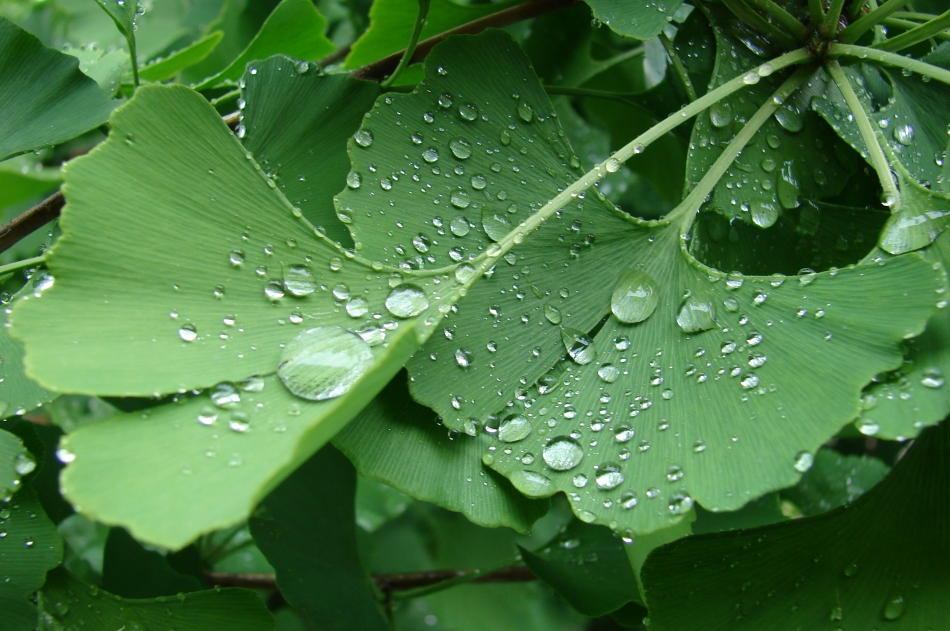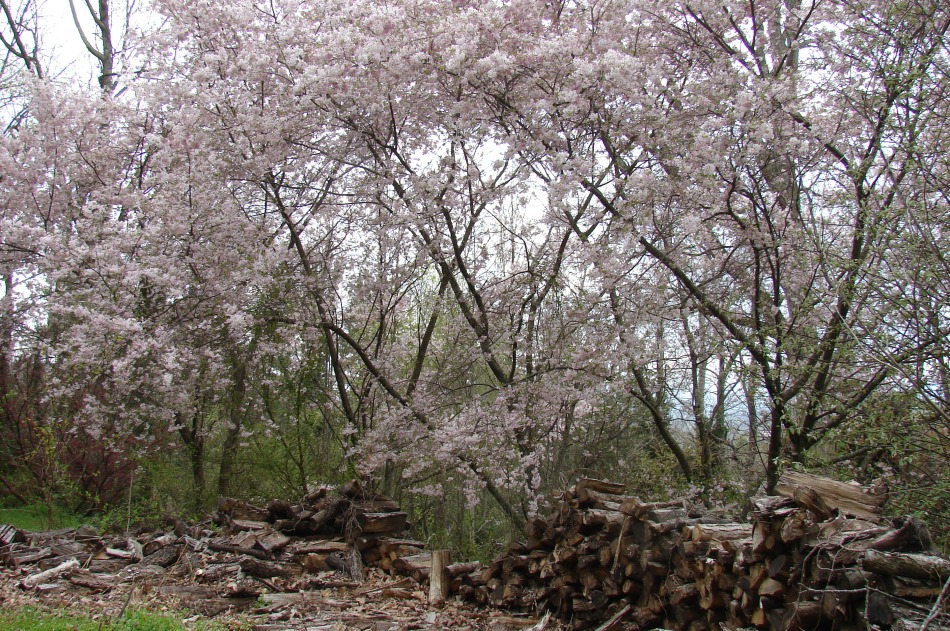Vultures in the Afternoon, July 6.16
*
*
*

*
*
Hot July wind, dry white cumulus
drifting, black vultures circling
rising thermal currents
the warm land
the scent of fallen life.
*
*
–Quilla
Old Dogwood
*
*
*
Mostly hidden now
in tall green thicket—overgrown
a thousand stalks of young bamboo,
a rough old dogwood tree
stands in deepening shadows, reaching
year after year, twisting
a long gnarled black limb, through
a green mesh of younger stems,
thirsting for the light
*
*
–Quilla
“Reflections on the Black Mountains…”
*
*
*
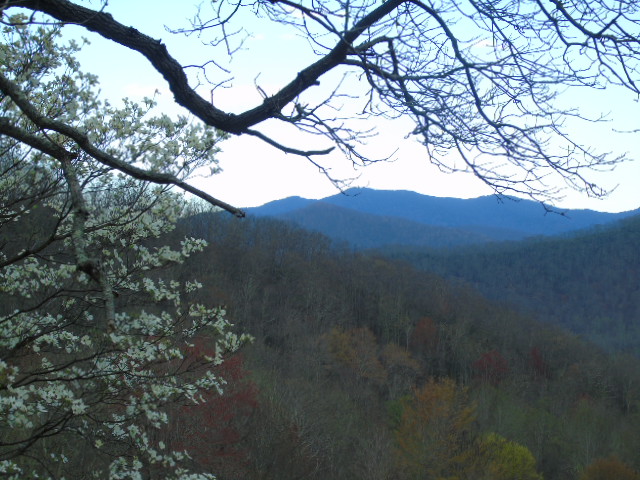
*
*
*
From my nature journal, April 20: Just before dusk, this windy warm spring day ends on a ridge overlooking the headwaters of the deep Cane River basin. The river valley is defined by the massive Black Mountains, highest in the eastern U.S.
Scattered across the steep grey slopes, serviceberry and magnolia are showing white blossoms now, as if clutching gusts of winter’s last snow. The dry evening air is hazy, bitter and sweet, scented with tree pollen, smoke blowing from a wildfire to the west.
Each day the pale green leaves of Appalachian Spring wash a bit further up into these ancient places, brightening dark hollows, wind-bitten ridges. Another month before spring fully reaches the spine of jagged spruce-fir crags, bristling wild and black as fur on the back of a winter bear.
“The Blacks” lift twelve peaks well over six thousand feet above the level of the sea. The Crest Trail begins near the summit of Mt. Mitchell, and climbs north, up and down the rocky spires of this true razorback ridge. Hurricane winds, rime ice, hail and bolts of summer lightning—all shape the severe character of these high places. Weather-scarred peaks along the crest offer incomparable layered views over the roads and settlements, out to the curving roundness of the blue planet.
Each year, countless billions of gallons of sky-water fall on these big mountains, drenching their forested watersheds. The rivers we have come to call “the Cane” and “the Toe” are born in cold fir forests and ferny woods left from the last Ice Age. Thousands of icy springs seep and gurgle snowmelt from under tumbled mossy boulders. Countless separate strings of water gather and splash down the steep slopes, weaving together into larger streams draining the settled valleys.
Even those streams join, flowing north, become the “Nolichucky”, a native word, tossing many highland waters together before rushing out of the mountains into the wide flats of the Tennessee River, down to the wider Ohio, at last pouring into the “big muddy” Mississippi rolling down to the sea. The spring night rain blowing against our mountain windows is a small trickle in this vast global water system.
For a long while I rest on a western slope, enjoying the sun’s last pastel lights lifting from the farm valley far below. Shadows of the big mountain behind me reach slow purple fingers across the tilled blossoming valley and up into the high rugged forests on the other side. Secluded coves darken with growing shades of night. Evening falls, and from some far hollow, the staccato night-song of a barred owl echoes. Finally, the April moon emerges over the jagged eastern ridge like a round white face speaking silent words of beauty, and wisdom.
–Quilla
*
*
*
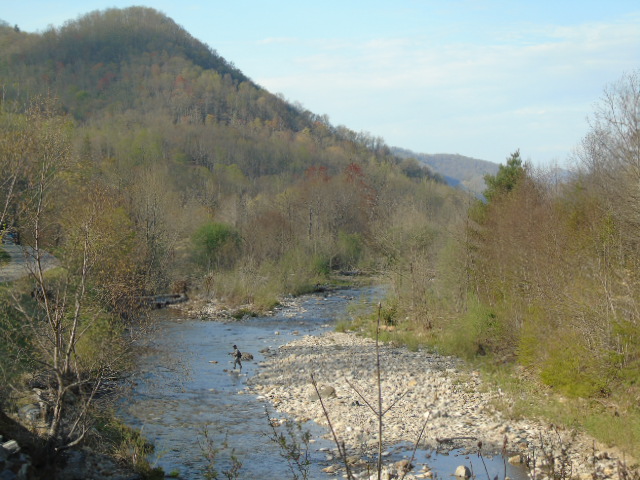
*
*
*
After Thanksgiving….
*
*
*
The weekend guests have gone.
How very quiet, the house is now.
A window open to the night—
long soft sighs, late November rain
*
*
*
The day before Thanksgiving
I walk the quiet lanes,
the old cemetery.
The vast November sky
streaked with white contrails,
people going home.
Above the somber fields
of gravestones, faded silk flowers
wide November sky:
One bluebird, perched
on a power line— facing east
into the pale sun.
The rich color of his breast
same as the mound
of fresh-dug clay.
He warbles softly
in the quiet air, as if
only to himself.
*
*
—Quilla
November 1.15
*
*
*
*
*
*
*
In Memory of John Parker
The last of 15 uncles died this week.
After his funeral, late this afternoon
I walked across the autumn fields alone
under windy grey skies.
There were crows calling in the distance.
Summer trees becoming skeletons again,
Cold wind tearing down the golden leaves.
*
*
–Quilla
Morning Snow…..1.26.15
*
*
*
*
Morning flakes of snow
sifting down, touch the black pool
disappear
Grey orchard limbs
last year’s withered apples
traced with snow
A cardinal alights
on a snowy branch—suddenly
the old apples glow
*
*
–Quilla
November 13.14
*
*
*
*
November Morning
38 degrees. The white sky thickens, lowering
shadow over the drab shadowless land.
A rousing east-wind shakes the stems, stirs
the tall seed-plumes of dead grasses
whispering something….
From the chimney, wood smoke tumbles west.
The curled and rusted oak leaves
still clinging to their branches
mutter secrets among themselves
like the old ones who’ve mostly given up—
—thin voices, rasping something
of hard weather, something of snow.
*
*
–Quilla
October 7.14
*
*
*
*
Sitting quietly
starlight and night wind, a leaf
falls into my hand
*
*
*
–Quilla
Haiku in late October
*
*
*
*
*
October twilight mist
Venus, glimmering
through bare trees
*
*
*
*
*
*
*
*
*
*
the old car finally breaks—-
dead leaves spinning down,
cold cloud shadows
*
*
*
*
*
*
*
*
*
*
the year’s last flowers
the last few butterflies
torn wings in the wind
*
*
*
*
*
*
*
*
*
*
autumn sunlight—-
quiet gallery room
pungent with bright oils
*
*
*
*
*
*
*
*
*
*
*
an alley of weeds
and garbage, one aster trembling
cool autumn wind
*
*
*
*
*
*
*
*
*
*
red October dusk
rattles the fallen leaves
softly, an Indian flute
*
*
*
*
*
*
*
*
*
*
late in the year
the last butterfly blooms
shaking in the wind
*
*
*
*
*
*
*
*
*
*
October afternoon
dry leaves, chattering
down the empty street
*
*
*
*
*
*
*
*
*
*
from the Amish:
the work horses standing
still now, twilight fields
trees turning gold
slowly, loosely together
the people walk to church
*
*
*
*
–Quilla
Summer haiku
*
*
*
*
night windows, cool rain
rattles the large leaves
gurgles the guttering
*
*
*
*
summer morning
rabbits, frolicking
the old dog’s grave
*
*
*
*
soft morning breezes
drift the clouds along, a few
yellow leaves flicker down
*
*
*
*
mid-summer darkness
fireflies dwindling
meteor streak!
*
*
*
*
High Summer, a Sultry Afternoon:
*
deep forest hush
wood thrushes silent now
*
high in the hot trees, cicadas rattle
like snakes, hissing loud warnings
*
waters of cold springs slither
and sigh, ancient mossy stones
*
great dark thunderclouds, gathering
tall silence, mountain afternoon
*
*
*
*
our high praises, lifting
to the mountains, while children
play in the fountain
*
*
*
*
morning cloudscapes
drifting silently, cicadas
buzzing in the trees
*
*
*
Sabbath praises
in the park, gentle breezes
sirens screaming
*
*
*
*
(self-portrait?)
old cantaloupe moon
setting in the purple hills—
my shadow on the wall
*
*
*
*
pages of Psalms
fluttering
summer morning wind
*
*
*
*
*
wisps of ice crystals
ten miles high, deep blue
summer mind
*
*
*
*
in her blue eyes,
high summer mountains,
thin white hair
stirs with a slight breeze
*
*
*
*
summer dusk
day’s last light falls softly
on the Appaloosas
*
*
–Quilla
*
May the Creator of all beauty
open your eyes, your very heart
to His perfect beauty, His deep forgiving Love
for you, this day.
I ask this for you
In the Name of the beautiful Son.
–Selah
A few summer haiku
*
*
*
*
One tiny swallow
fluttering across the vast
cumulonimbus
*
*
*
Silent summer noon:
in the great dark trees
a Wood Pewee…..
*
*
*
Rising from the dead
winter leaves, how silent—
ghostly Indian Pipes
*
*
*
That old Redbone
up the road, howling
the warm summer moon
*
*
*
My neglected garden—
a crow flies off,
strawberry in her mouth
*
*
*
Quiet summer dusk
fireflies flickering
distant thunderhead
*
*
*
Day’s last glimmering
in the dead Hemlock snag
sings a small dark bird
*
*
*
Field of bones
at night: fireflies rising
from the grave lamps
*
*
*
Too dark to see:
distant horses, snuffling
the warm summer dusk
*
*
*
–Quilla
May 10.13
*
*
*
*
*
Crossing
Before the wind rose and the night dew dried, two deer
walked across the hillside meadow in the emerald stillness of morning.
The tops of the tall spring grasses brushed their brown bellies
as they carefully stepped across the wide opening between the trees
on either side. The deer in front–the smaller of the two–stopped
and looked back at the larger one following, as if to make certain it was there.
The low sun was still thick with rising mist, making bright shadows
of the deers’ brief passing through the tall wet grass.
They walked into the shadows of the woods
and were gone from sight. The parted grasses
closed behind them, leaving no trace of their crossing.
*
*
*
March 29.13
*
*
*
*
*
A Late Spring:
A shaft of sun breaks through
the billion spin-drift crystals,
the glittering soft spring snow
On the pastured hill, five horses
gallop swiftly down, the salty wind
streaming manes and tails
A Yellowhammer wails and hammers
the lost spring, the dark tossing
limbs of the snowy pine.
Whitethroat sparrows trill on the wind
from tangled winter thickets—tiny flutes
of mendicant forest monks
Vultures soar above the hill, black wings
make shadows with the snow-blown sun, knowing
everything falls back at last into the land.
*
*
–Quilla
March 27.13: 4 a.m.
*
*
*
*
*
*
*
*
Four A.M.
On the darkened walls
of the quiet room
firelight flickers gold
On pale blue fields
of freshly fallen snow
spring moon softly glows
*
*
–Quilla
*
“I will give you the treasures of darkness
and hidden wealth in secret places,
So you may know that it is I
the LORD, the God of Israel
Who calls you by your name.”
–Isaiah 45: 3
*
*
*
March 12.13
*
*
*
*
*
Each day, the sun circles higher
warming the winter land.
This day, the last scraps of old snow
melted back into the ground.
Tonight, mild latewinter rain
patters the mat of old leaves.
The tiny frogs have awakened.
Their ancient, jubilant bells are ringing
again, through the rainy dark.
*
*
–Quilla
Ironwood. . . .(for the Cherokee)
*
*
*’
*
*
Ironwood
(for the Cherokee)
Strong grey sinews of Ironwood
twist slow lives hard as bone,
rooted under cold blue streams,
shining riversand, ground like time
from gray flood-rumbled stones.
Centuries tumble without number:
lost generations of earth-brown
laughing girls, raven-shining hair
grew into wizened grandmothers
snow salting their long braids
they walked the rooted maze of trails,
singing Creator’s beauty, mystery
and wisdom—interwoven designs
as Fathering sky poured His love
into the wild, unbordered land.
Now they are each and every one
forever gone. Moccasin tracks all melted
with the melted snow of years,
shadow prints all washed
from the shining riversand.
The old songs are silent now, as owls
sleeping in the winter sun.
Still, soft mists lift from the cold streams,
the ancient tumbled stones.
Wind rattles the Rhododendron leaves.
Strong grey sinews of the Ironwood trees
stand silent by mossy streams,
letting the blue winter mist drift through.
*
*
–Quilla
One Winter Night
*
*
*
*
*
Night Wind
This long February night, fierce winds
blown down from wide Saskatchewan
roar our little southern woods.
The tall brooms of black trees
sweep the high winter moon across
the sky’s eternal floor.
I put down the book, turn out the lamp.
Wild shadows dance the moonlit floor.
Entering the tides of sleep, I stand
before the dark ocean of dream, bringing
wave and wave of broken moonsilver
washing the long black glittering shore.
*
*
–Quilla
*
*
*
–Quilla
February 10.13
*
*
*
*
*
Winter Deer
Completely wild, the winter-grey deer
emerge, furtively, shadows walking
from the deer-grey shadowy woods
Large dark eyes, glistening, watch.
Silent sharp black hooves
step among the mesh of frozen twigs,
the frosted thatch
They risk the open light—to browse
the lower lichen-crusted limbs,
the sweet unopened spring buds
of the sleeping Plums
And to lick their long grey tongues
against the block of mineral salt
I set out for them upon an old pine stump.
“Surely now, I have my reward”.
*
*
*
*
*
Tuesday, February 5.13
*
*
*
*
*
Winter Morning
At the morning window
watching clouds drift so quickly
over the winter land.
A few patches of old snow
lingering blue, in shadow places.
The leafless birches are screaming with jays.
Due south, and high above
in the pale blue spaces between fast clouds—
the faint white sickle of waning moon.
*
*
*
January 17.13
*
*
*
*
Before Bed
End of day, opening the door
one last time to smell the pungent air,
look out into the whelming January night:
still more windless rain is falling,
the sound of countless steps, stepping
across the huddled ages, the winter grass,
the sodden, fallen leaves.
These hosts of invisible water-feet
walk the floors of darkness, beyond
our walls, our garden, sighing far
into the night-fields, the black forest,
farther than the simpler daylight mind
will let us think, or go.
So it’s only rain.
I close, and lock the door.
*
*
–Quilla
Treasures in Darkness
*
*
*
*
*
*
*
*
Treasures of Darkness
Brilliant winter sun, the early frost
is gone. Still, the shadow places steam—
rays of light keep rising, finding,
giving the hidden places warmth.
So it is with cold blue spaces in me.
I stand what seems a long time, watching
the windless sunlight glisten
a million silky needles in the pine.
These shining green threads of luminescence
are lifted, gleaming in the winter air
by heavy black limbs
living in cold shadows, underneath.
*
*
“I will give you the treasures of darkness
and hidden wealth of secret places,
so that you may know that it is I,
the LORD, the God of Israel
Who calls you by your name”
–Isaiah, chapter 45 verse 3
*
“The true Light, which enlightens
every man, came into the world.
In Him was life, and the life
was the Light of men.
The Light shines in the darkness,
and the darkness has not overcome it.”
–John, chapter 1, verses 9 & 1
*
*
*
From the top of Elk Mountain, after Sunset
*
The red December sun has gone to sleep
in the folds of purple mountains.
A few stratus rags of cloud follow, scarlet
smoldering down to charcoal, and smoke.
In the dark hollows below, large owls
start their ominous night-talk.
*
A sharp gust of wind rattles the oaks—
the last curled husks of leaves still cling
like fingers, to the summer that is gone.
In the darkening afterglow of day
winter stars sparkle through the haze.
*
*
–Quilla
Night Sounds (7.30.12)
*
*
*
*
*
*
*
*
*
Night Sounds
Sleepless, I take the pain downstairs,
sit in darkness, long moments of stillness
trying to let it go, watching, listening:
the room is lit with setting moon
glimmering, thick night mist;
I can barely see the pictures
of our daughters, as young girls
smiling, on the wall;
opened window, night cicadas
rachet down that fierce mating chant
diminishing, in black latesummer leaves;
small owls quaver softly, their first summer
hunting in the shadowy trees;
a far train moans long, going downriver, alone.
In the kitchen, rocks of ice drop, and drop
all night, into the icemaker box;
ancient mother-wolf chases an old caribou
across deepening snows—the small dog
in her basket, whimpers in her dream;
encaged in my skull, tinnitus screams
to the quiet walls of bone, whining like a fiend;
slow breaths rise and fall like breaking surf,
like children’s castles rise and fall, wash back,
old men walk the edges of the sea;
how softly, sadly, just audible below,
this worn heart pulses—throbbings of a distant drum;
on the wall, clock clicks, clicks, clicks
like grains of sand, sifting down. . . .
like rocks of ice, falling into a box.
*
–Quilla
March Twenty-fourth
*
*
*
*
The Evening Robin’s Song
How could he know? He couldn’t—
how sweetly flows the wild liquid spring
of his voice, his twilight courting.
The plump female on safer limbs beneath him
listens silently, but this ancient nascent
music spills fountains of mystery to me.
After a long year, and winter, they’re wanting
to gather dead sticks, and moss and weave
a strong life-circle of thatch, and make
a clutch of sky-blue eggs, to break
another year of Robins, into being.
How many centuries, eons has this been?
Dark clouds gather cold, the western mountains.
His high-up perch, tossing tip-top twigs
of a birch, swings the fiery sunset breeze.
He doesn’t care. The plump and ready one
beneath him, she’s enough to weather any storm,
the burning need to make their young.
And so again I ask: how could he know,
or care, from a windy sunset tree,
how much his winsome evening song
can mean—to the wizened likes of me?
*
*
–Quilla
March Sixteenth
*
*
*
*
By Planet Light
(On the night of their conjunction)
The great one we’ve called ‘Jupiter’
and our bright near-sister, ‘Venus’—
rock and vapor beings, reflecting beams
across vast emptiness
narrow shafts of luminescence
find our cool Spring darkness.
Innumerable photons, unthinkable distances
the Sun sees their round, childlike faces
turning faithfully, eons of endless space
now twinkling our twilight shadows.
The small one still alive in us
pauses, looks up, and wonders.
At the black wood’s edge
dim clusters of plum petals, glimmer
fragments of the far, soft light.
We watch and feel, we remember how brief
how real, this earthy human love.
*
*
“The heavens declare the glory of God
the skies proclaim the work of His hands.
Day after day they pour forth speech
Night after night they display knowledge.” —Psalm 19: 1-2
–Quilla
Images of December
*
*
*
*
*
*
*
*
*
*
*
*
*
*
*
*
Hostas in December
*
*
*
*
*
*
*
*
River reflection
*
*
*
*
*
*
*
*
Near McKinney Gap, NC
*
*
*
*
*
*
*
*
Fountain Spray
*
*
*
*
*
*
*
*
December sky
*
*
*
*
*
*
*
*
Sycamore bark
*
*
*
*
*
*
*
*
“And the Light shines in the darkness…..”
*
*
*
*
*
*
*
*
Sycamore and Pines in December
*
*
*
*
*
*
*
*
Another door into Narnia?
*
*
*
*
*
*
*
*
Crepe Myrtles, December
*
*
*
*
*
*
*
*
December Morning
*
*
*
*
*
*
*
*
Beached for the winter
*
*
*
*
*
*
*
*
Farrah and her Mom, devotions together, Daytona, December 07
*
*
*
*
*
*
*
*
Behold!
*
*
*
*
*
*
*
*
Epiphany
*
*
*
*
*
*
*
*
December night
*
*
*
*
*
*
*
*
Gable on Episcopal Chapel, Charlotte St., Asheville NC
*
*
*
*
*
*
*
*
*
*
*
*
*
* * *
December Fifth
*
*
*
*
*
*
*
*
*
*
*
*
*
Splinters of Winter Light
December morning, my footsteps crunch
the crystalled grass.
Looking up through frozen birches, and beyond
my arms lift their hands: palms, thin fingers
stretch with praise to the winter sun
splintering rays through icy limbs.
I give my self afresh—to the Risen One.
The whole domed canvas of wide sky
shines winter blue, brushed white strokes
of high cirrus: windy tails of ghost-horses
like wisps of spirit running, slow motion
across the empty skies of time.
One Chickadee arrives, thirsty
and perturbed at the frozen pool.
She pecks the plate of ice
till it breaks open, just a bit.
She sips and sings, and flies away.
In the far meadow two deer
are standing in the open
a moment sculpted, like statues.
A poise of grace and fear
their blue shadows stretch out long and thin
down the frosted hill.
Something frightens them. They bound off,
disappear in the shadowed wood.
*
–Quilla
For Olav Hauge
*
*
*
*
*
*
For Olav Hauge
*
Cool gold-green lights, I’m reading old Olav
again—-that weathered rustic poet from Ulvik,
the vast rock-slabs of west Norway.
Again summer’s emerald radiance tarnishes
toward shadows, bronze and rust.
Thrushes hushed now in the forest.
Tall yellow grasses, insects chant
their last feeble songs before the frost.
My old coat and hat feel good again.
His words read rugged and tender,
raw pain, sparse passion
arctic blossoms, the tall ice walls.
Ragged sea-mists gusting upward,
the deep blue fjords of his heart.
His steep crags of mind—jagged rocks,
high and windy scarps
—he takes us there in mountain wind,
closer to Creation’s wild heart
joyfully alone.
Sweet tangs of apple smoke drift up
from the pruned orchard fires,
smoldering far below.
Salt breath, fresh from the North Sea
sings the holy wildness in my bones.
*
—Quilla
*
*
*
Mountaintop thistles in September
*
*
*
*
* * *
Three Meditations on White
*
*
*
*
*
*
*
*
*
*
*
*
*
*
Three Meditations on White
*
Those high wild wisps of Cirrus
like spirits, or sails, long white tales of mares
crossing the prairies and seas of sunset sky;
*
Those soft glimmerings in the far
shadowy meadows—the backs of Appaloosas
stepping slowing, gracefully into the trees at dusk;
*
And close at hand, near my chair:
one white September rose, soft curled petals
barely stirring, the cooling twilight air.
*
*
*
*
*
*
*
*
*
*
(and a fourth):
“Every good thing given is from above,
coming down from the Father of Lights,
in whom there is no variation
or shifting shadow” –-James chapter 1, verse 17
*
*
* * *
Hawk
^
^
^
By the window, reading scriptures
with morning tea, first I saw his fast shadow
sliding toward me from the shady wood.
Early yet, the shadows were still long
and leaning from the east
across the wet, the glistening grass.
A second or two he passed before me
—wide grey wings set in a steady glide,
the edge of a knife—the Cooper’s Hawk
sliced the stillness of the morning air.
All the other birds fell quiet,
frozen wild with fear.
My gaze returns to the holy words, sleeping
centuries in their stately place.
But it’s not the same: the Hawk has shown
how brief how beautiful, fierce life is.
The words of Life wake up, spread strong wings,
fly toward me from the page.
^
^
^
Images of February 2011
^
^
^
^
^
^
^
^
^
^
^
^
^
^
^
^
^
^
^
^
^
^
^
^
^
^
^
^
^
^
^
^
^
^
^
^
^
^
^
^
^
^
^
^
^
^
^
^
^
^
^
^
^
^
^
^
^
^
^
^
^
^
^
^
^
^
^
^
^
^
^
^
^
^
^
^
^
^
^
^
^
^
^
^
^
^
^
^
^
^
^
^
^
^
^
^
^
^
^
^
^
^
^
^
^
^
^
^
^
^
^
^
^
^
^
^
^
^
^
^
^
^
^
^
^
^
^
^
^
^
^
^
^
^
^
^
^
^
^
^
^
^
^
^
^ ^ ^
Tuesday Morning December 7: The Color of Mourning Doves (revised)
^
^
^
^
^
^
^
^
^
^
^
This morning in early grey snow-light I stood at an upstairs window, looking out into blustery snowy air. Large flakes whirled through the limbs of the birch tree beside the house. The window was partially steamed, but I could see a dozen or so Mourning Doves close by in the bare branches. They bowed like the devout silhouettes of old Franciscans, praying against the desolation of the day. The bleak winter sky loomed over the huddling silence of the doves. Gusts of wind moaned at the window, shook the black tree and the birds. The doves rocked and swayed on their thin perches among the frozen catkins of next April, but they did not fly away.
^
The low December sun was completely hidden in heavy snow clouds. As if we’ll not see it again til Spring. The rolling land lay drab and harsh, dusted with more snow blown down in the night. I could not see the horses in the pasture, or the old donkey; they were sheltering close together, somewhere down in the wooded hollows out of the wind. This kind of morning makes winter seem a curse, the land stricken hard by the blue wand of an evil white witch with fierce icicle teeth. The lashing dragon-tailed wind is her unchained mongrel. She has not known love or a warm touch in a thousand frozen years.
^
At the window, looking out at the shadowy land, my eyes lingered on the delicate pastels of the breasts of the doves. Molded feathers of pale roses and ash, the doves glowed softly like winter sunrise on the underbellies of smoky snow clouds. Those pale colors curl inside old ocean shells held up to the light. And we find these same hues hidden as earth-shine on the rounded dark side of a crescent moon—an iridescent shade glimmering soft translucent rouge. This dark winter morning a faded rose blushes the breasts of doves.
We stand in wonder, and must respond to ineffable mystery. With childlike brushes, we crush and mix our paints, lyrics and tunes as if they were divine syllables that must be spoken. The earnest desire fueling our art is to return a few shreds of the immense and intricate glory shown to us, these fleeting days and nights.
^
I see from their fullness, the doves have filled their little furnaces with the handfuls of yellow millet I threw to the frozen ground for them last evening. Deep inside their sleek and rounded bodies hunched in the icy wind, the gold seeds are burning, returning the stored sunfire of grain fields grown tall under a summer sky. Sun flames become millet blades and seed, transforming into winter Morning Doves— those glowing rose-grey breasts, plaintive moonlike songs, softly whistling wings.
^
^
^
^
^
^
^
Sunday, August 8, 2010
*
*
*
The Days We Call August
Another dog-day Sabbath
steeps in the deep gold sun.
Summer leaves have hardened
into jade, hushed and stilled,
the strong red tea of heat.
Incessantly, cicadas drone away
their life song—–late summer’s
sibilant death song: like seed-pods shaken,
this ancient chanting
rattles the dry trees.
*
But soft tones from Liz Story’s piano
—strokes of cool black musical silk—
hypnotize us to the bone.
The ice in our glasses settles and melts.
Man-made wind, the whirring fan
keeps teasing the loose pages of words—
today’s edition of the Citizen-Times
fluttering, begging to be read.
Or maybe not.
Each day, tall clouds of turbulent earth-steam
rise violent from the heated land;
and like the centuries of raving headlines,
quickly fade away.
*
Somewhere far below, a shining river
keeps flowing deeply through our minds—
all the winter snows letting go, seeping down
high mountain firs and rocks,
dark forest hollows, the treacherous slopes
of human memory.
A thousand generations of wild trout
swim freely in the dappled water-shadows.
*
What we believe, what we fear
and yes, what we most desire—
these are the true powers that shape us,
make us into what we are.
*
*
*
*
*
*
*
*
*
Singing the Old Hymns
*
This morning twelve of us from church
drove to the Baptist Nursing Home
to sing the older hymns.
Down the florescent linoleum hall and through
the loud double doors, we found them—
fifteen or twenty crumpled white ghosts
of humans–mostly women, and a few men
sitting in a warm bright room, silently staring,
waiting, waiting.
*
Blue-veined delicate hands
had held and given so much life
lay folded quiet, or twitching, in their laps.
*
Our songleader/guitarist good-natured Nate
with the red beard, introduced us.
His joy briefly displaced the obvious
yet unspoken truth, spelled out
in precious faces gazing pitifully,
blankly back at us.
Were any of them here, to hear us sing
because they wanted to be?
*
Using the Home’s old brown hymnals, we sang
fervently of the Cross, the Blood, the Spirit
with fresh exuberance (I felt the sweat
like blood, trickle down my spine).
Everything living in us
wanted to dispel that horrid spell
cast upon these withering lives,
cast upon us all.
We were born for more than this!
*
After the singing we greeted them,
held a moment their feeble blue hands,
poured love into their wistful eyes.
And then we said good-bye to them,
and walked back down the hall.
*
*
*
*
*
* * *
Late Summer, Other Beings
*
*
*
*
*
*
*
*
*
*
Late Summer, Other Beings
This hot, burnished August morning
not yet ten o’clock, already ablaze
with burning light, the heavy air
sizzles, sings: cicadas rattling away
their brief summer lives
mating in the listless trees, resound
like rattlesnakes coiled inside
a large bronze jar of days.
In leafy mosaics of green shades,
our voices calmly discuss
more importunate things.
The thick air barely stirs
these languid morning hours.
Already our faces moisten with sweat.
How casually we watch dying butterflies
drift through our net
of fleeting thoughts and words,
flower to fading flower.
*
Motionless bright wings, they float
silently in space, long moments
of beauty, delicate, lingering . . . .
Their brief days fly with such quiet
yet certain passion, suspended
on invisible currents
of time and air
that we—nor the tall curtains
of flaccid birch leaves
—can scarcely feel at all.
*
*
*
*
*
*
*
*
*
*
*
*
*
*
*
Stephan’s toe, friendly butterfly
*
*
*
July Moon, Epiphany
*
*
*
July Moon, Epiphany
Waking in warm darkness
moonlight floods the floor at 4 a.m.,
injured shoulder aching, not able to sleep.
*
I walk outside, the only man alive,
sit quietly a long while: cool air,
the full moon’s soothing light.
All is stillness, but a few big trucks
out on the highway, over a mile away.
At this hour, even the night cicadas have hushed.
Summer’s last fireflies twinkle across the fields.
*
To the east, the stars of early autumn are rising
shimmering unthinkable distances
above the sleeping trees.
Jupiter sparks and gleams, spinning slowly
an arcing path of endless years
through silhouettes of leaves.
*
A thick mist lifts from the warm land.
A full pink corona halos the moon.
It floats in heavenly beauty—pure serene
eternal space, a large Mimosa bloom.
Suddenly I know: there is a place
of fragrant light, unknown by any pain.
*
*
*
*
*
* * *
Summer Sunset
*
*
*
Summer Sunset
That large bouquet of white cloud blooms
directly overhead, has caught on fire, glowing
the day’s last burst of flames.
Ashes of rose-light settle on everything.
We watch the final hour burn down
like petals of sacrificial flowers, incense dust.
Night cicadas start incessant chanting.
A small owl whinnies in the darkening trees.
*
Today we swam in the mountain river.
Eons of waters gathered from the whole earth
washed our pale bodies, the timeless stones.
My father brought me to this same deep pool
fifty years ago.
All the splashing, laughing people here today—
not one of them existed then.
*
A tall thunder castle was looming up
over the high mountains, rumbling down
long cloud halls and lofty towers.
Dark fires, shining edges flaring out
swallowed the little sun.
People hurriedly gathered their things
and went home.
*
*
*
Now,the Time of Day…
*
*
*
Now, the Time of Day…
…when doves come fluttering down
the summer evening light,
their last feeding before dark.
Those large rose-grey wings
pinions scoop the whistling air
cooing ancient woodwind music
settle softly to the ground.
*
The sun fades into the forest of leaves
splintering the day’s last warm blaze
like fire through cut emeralds.
Far in the dry fields, dusty horses
their long shadows
graze the tall gold blades of grass.
*
Could peace come down at last, to earth
to each of us, falling like this—
simply, hunger gnawing
our empty hearts at nightfall
such wings of strength and grace?
Could peace come down to us like this—
like doves at dusk
the falcon’s eye and talons closed?
*
*
*
*
*
Thunderstorm
*
*
*
Thunderstorm
The long July afternoon, a towering cumulonimbus
comes gathering itself, grumbling somber, growing
taller and blacker with each hour, enormous dark
electric flower bent on some revenge.
An angry god of fire, it strides across the mountains
down into our valley, kicking its flashing boots,
cursing loudly, intent on breaking things.
The air has gone intensely still. Birds are silent,
flown deeper into the shadowed woods.
The very light pales yellow with fear.
*
Now the first gusts rise and rush, filling the trees.
Millions of leaves show their undersides, flushed
from jade to bloodless white.
The air has chilled—the last cicada
ceases rattling its paper wings.
Butterflies cling to the large purple blooms
bouncing in the wind. What else can they do?
*
Lightning flashes! The stricken air crashes
in upon itself, trembling the windowpanes
—OH our cruel history of terror—
innocent millions, huddled under bombs
exploding louder than this, shattering forever
the little straws of their lives!
*
The small dog jumps into my lap, shivers
in the shelter of my arms.
And the sweet old Shepherd who died last fall
—the one who shook at every storm—
today, I’m glad her bones lie quiet,
buried deep in garden loam.
*
*
*
*
*
*
* * *
Summer Morning Rain
*
*
*
*
*
*
*
*
*
Summer Morning Rain
*
Windows open, I wake to the long, refreshing
sigh of early rain in the trees.
Three weeks of intense heat and drought,
the land is dusty, hard with thirst.
I am alone. My wife left at dawn
to get our golden daughter to the plane.
*
Water music fills the vast auditorium
of cool morning air.
I sip a large cup of green tea.
Soft notes of a bamboo flute breathe deep peace.
In the distance sirens scream and scream
and scream, then die away.
*
I can not find the words for this
invigorating joy—how fragrant morning rain
quenches the thirst and sorrow, of everything.
I can not breathe it deeply enough, let it wash
the dust of bitter, anxious thoughts.
*
Birds are singing, mating in the resplendent trees.
Wet grey doves fly down to the feeder,
shake beads of water off their wings.
Raindrops splash and fill the stone birdbath,
dimple the surface of the garden pool.
*
All praises to the One
who brings us drought and rain!
This cloudy scintillating light, everything glistens
drips and sings: liquid silver falling from the sky,
our very souls refreshed, with living green.
*
*
*
A Yellow Summer Moon
^
^
^
^
^
^
^
^
^
^
^
^
A Yellow Summer Moon
After the hot and difficult day in town, I sit in the dark
to rest and deeply breathe, to cleanse my mind.
A round yellow summer moon rises slowly
through warm haze, a kaleidoscope of black leaves.
^
Tiny greenish lamps of fireflies float and glimmer
across the garden, the far meadows.
Beyond the western mountains, the sky flashes silently
shades of violet fire , approaching storm.
The darkness stridently sings —black electric music,
thousands of insect legs and wings.
We notice little, beyond the closed boundaries
of our desperately hungry selves.
We are such easy prey.
*
A slight breeze begins to stir. Night is fragrant,
lingering sweetness of the day—scent of cut hay,
honeysuckle, fence-row thickets of wild rose.
Behind the empty wood-shed, the yellow moon
is splintered, perfect wholeness flickering
through silent leaves of the tall bamboo.
* * *
“Of Time and the River”
^
^
^
^
^
^
*
*
*
“Of Time and the River”
Today, the river rushes turbid brown
with recent mountain thunderstorms.
Black willows reach over the crashing waters.
Their luminescent leaves are quivering, dancing
like river-nymphs, playthings of the summer breeze.
Mid-afternoon, a remote sandbar, far downstream
between two mountain towns.
Every few minutes, a car or truck rambles down
along the winding nineteenth-century road
blasted out of river cliffs. Today, almost everyone
takes the Interstate a few miles to the East.
But here, all is much as ever was: thunderheads
pile up, the tall earth-steam of afternoons.
Tanagers hide their scarlet beauty, raspy singing
high in the sawtooth leaves of sycamores.
Lofty granite cliffs and ledges of the gorge
(up where the river flowed, eons ago)
lodge rattlesnakes in cool, inaccessible rooms.
Cicadas rattle and drone, the wide white rapids toss
and surge, washing down the riverbed.
Grain by grain, sand is made from stone.
From somewhere in the tall rank weeds
and broken highway rocks, floats the hot, sweet-sour
stench of death. Jagged vulture silhouettes
soar on rising thermals, along the looming wall
of tremendous, slate-gray thunderheads.
But who am I? to sit with pen and pad—
this transient bar of river sand, mussel shell and storm wrack
left by the winter floods—a summer afternoon in time,
and scribble down such temporary, timeless things?
*
*
*
*
*
*
*
* * *
Two days before Solstice
^
^
^
^
^
*
*
Two Days Before Solstice
*
The winds of spring have blown.
Now the long year’s longest days have come.
With dark spice scents, Earth warms herself
like a naked sunlit stone, and gotten still,
quieted down—a mother radiant, fragrant
with the fathering spirit filling her, giving life.
Spinning secret webs of grass and mud
and horses’ hair, she weans her nestling young.
Oh, the deep emerald heart of June!
The very light shimmers in verdant haze.
And this hard, concave image of noon—large bronze bell
hanging a mute shadow over us—softens, vanishes
like mirage, into the day’s falling shades, the smell
of warm trees, endless afternoon.
The air itself is heavy, listless now.
Intricate perfumes drift from amethyst blossoms
flickering with butterflies: black and yellow
swallowtails, wings uttering silence, suspended
in the heady purple blooms.
Coiled tongues uncurl, and drink the nectary oil.
Pure energy freely pours from the god-like sun
unfurled like love, like light, on everything.
*
*
*
*
*
*
*
*
*
*
*
*
*
*
* * *
For Mei Yao – ch’en
*
*
*
*
*
*
*
*
*
*
For Mei Yao – ch’en
One thousand years ago, you wrote
beside a whirling stream, a deep ravine
an ancient temple amid windy bamboo
as you passed by the monastery at Pao-Ying .
That night, you scratched some words
with a quill beside a smoky lamp.
Somehow, your words were kept.
Nine centuries passed.
Came the year of our Lord, 1,963.
The brilliant Indian scholar
Amitendranath Tagore translated your words,
and those of eleven other poets from the Sung.
Ten years later Grossman published Tagore’s work.
Thirty more years passed, a new Millenia.
The year numbered 2,003.
A gifted Colorado writer was poking through
a used-book store in Denver—
a steel and glass city thrown up on the high plains.
In the dusty stacks, he found Tagore’s book
marked way down. He thought of me and picked it up,
paid two bucks and sent it along, with a kind note.
I’ve read your poems many times.
Now the year 2,010, this summer sun setting
I read your lucid words again.
Windy shadows sweep the page.
Like time, a stream still flows
through tall bamboo, whispering
poems into the deep ravines.
A warm breeze flutters the thin leaves.
Poems are still being born,
this fleeting golden light.
*
*
*
*
By Yang Po-jun
*
*
*
*
*
*
*
*
*
*
*
*
*
*
Denver windows
*
*
*
*
*
*
*
*
*
*
*
* * *
Loss
Old church, Cane River
*
*
*
*
*
*
Inside, the main sanctuary
*
*
*
Loss
The wide, white stone ledges we thought so firm
those rocks we stood upon—have crumbled under us
fallen to rubble and shadows.
The sun’s long fingers are gone, withdrawn
like a shallow, temporary grace of light
from the dark and needful land.
Those deep, green picnic pools we knew and loved
like children, have sunk down, dried up like our laughter
revealing boulders, long-submerged.
Now, empty spaces where no one swims
the buzzing flies fly through.
Just sharp rock edges, the skeleton of a fish
and dry, gravelly sand.
What’s left of me, vestiges of you.
*
*
*
*
*
*
Falling away
*
*
*
* * *
Something Deep in us Almost Understands
*
*
*
*
*
*
*
Something Deep in us Almost Understands
We say it was the noble Cherokee
made to walk the horrible ‘Trail of Tears’.
Indeed they did, over a century and a half ago—
forced to leave their ancient homeland, in winter,
dropping their precious ones starved and frozen
into shallow graves, or none at all,
six hundred miles of wailing nightmare.
*
When we try to imagine what we can not imagine
—that unspeakable suffering—the large beaks
of the vultures descending, something deep in us
almost understands: we’ve all been deposed
from the Fatherland.
And in the darkness of our secret hearts
we weep— for us, and them.
*
We like to label our indigenous brothers weak
toward ‘fire water’—“an addictive gene”,
a “genetic propensity”, we condescend to say.
And we should know.
After clipping their wild eagle wings, skinning
alive their red freedom like the buffalo wind,
our white fathers locked the natives in the stockade pens.
There, we baptized the savages
with the demonic mercy of easy drink—
the only way to kill the pain, the howling need to escape.
And there they grovelled in the waste and vomit
of a new, beguiling god.
*
If and when we ever stop, and think of it
something deep in us almost understands:
each, and all of us have lost our wild-born beauty,
our soaring freedom wings.
We grope and guzzle anything–even religion—
to numb the edge of inexorable pain.
We rationalize, condescend, preoccupied
forever busy with smaller things.
While in the darkness of our secret hearts
we weep— for us, and them.
It’s then, and only then
we almost understand.
*
*
*
*
*
*
*
*
*
*
* * *
Bottomland Farm, Cane River
*
*
*
Bottomland Farm, Cane River
A morning in spring, I was walking new-plowed land
beside the shining river. It was flowing full of snowmelt
from the high mountains, alongside an aboriginal path
now paved and known as 19-W, following the river
we now call the Cane.
The lower fields had just been turned.
Rain had fallen in the night, washing the cut clods, clean.
In the fresh-rolled furrows of alluvial loam
lay a few shards of native pottery, broken by decades
of steel plows, tractors and harrow blades
breaking open, each spring, the soft rich land.
Distant past was risen there, in pieces, to the light.
I held each dirt-brown relic in my hand
and wondered: who was the last human to hold
this hand-formed piece of river clay? And when?
How many centuries back, how far upriver in time?
Exactly who was the one whose fingers fashioned it
moist and yielding, fired it hard in the hardwood coals?
Oh, to look into her dark eyes, to see and know
the giving land, as she and her tribe knew it then.
Standing there in April sun, this space in time
we’ve numbered 2,010, wistful
for the little curved fragments to speak
their truth to me, to tell their broken stories whole.
To hear the ancient music, primordial songs
of the lost People beside the river, fallen hundreds
and thousands of springs ago, right here.
All their blood, each tooth and fingernail and bone
has vanished—back into the nourishing land.
*
*
*
*
*
*
*
*
* * *
After a Storm in the Night
*
*
*
After a Storm in the Night
Lingering pain from surgery wakes me again
I walk outside. The waning spring moon
emerges from curtains of dark cloud.
Distant thunder is still mumbling.
All the trees are dripping with rain.
Locust blooms perfume the moist, sweet air.
Wide fields of mist, fireflies twinkle the far
memories of childhood.
*
White roses glow the milky light.
Deep in a shaggy black pine, the moon
remembers how her brush-strokes
painted an ancient Asian silk.
To witness such beauty, while hurting
is still far better than painless sleep.
*
Fine art flows from springs of grace:
only thirsty hearts drink deep from wonder.
Minds and bodies withered, broken, finally
find true healing, quench their fire
in streams of natural praise.
* * *
^
^
^
^
^
^
^
At the High Mountain Lodge
An evening in late spring, supper with friends
who live in the higher mountains.
Bowls of steamed barley, fresh garden greens
and vegetables are shared, heartily consumed.
Afterwards, the women gather in the kitchen
laughing and chattering, nurturing each other,
cleaning the supper plates.
For the men, the talk predictably turns
to politics, and war. Unnoticed, I get up quietly
slip out the door, the cool dusk air.
A thunderstorm passed, flickers yellow,
grumbling in the mountains to the east.
Fireflies sparkle the dark meadows below the lodge.
Down the blue valley, wraiths of mist rise from the forest.
I lean on the porch railing, long minutes alone
listening to a wood thrush, the last glimmering light.
His music—clearer than a fine silver flute
ethereal, not like earthly sounds.
Darkness thickens, the thrush hushes singing.
Endless mountain hollows fall silent with the night.
Behind the open lighted door, cheerful women voices
are putting the dishes and food away.
As always, the deeper voices are still at table
analyzing things, laughing, blaming the man
they did not vote for—the mess the world is in, as if
it all began last year. As if their man (or any man)
or mere party could fix what has, for decades
gone terribly wrong.
They agree among themselves, and laugh again.
I have joined such talk countless times.
*
In these small ways and countless hidden places,
giant myths, hungry idols and dragons
of power are nourished.
We’re so very slow to learn.
By our blind words of faith in them,
they stay alive.
* * *
“Do not put your trust in princes,
in mortal men, who cannot save” –Psalm 146:3
*
*
*
* * *
Nocturne #2
Nocturne #2
Awakened by something
far, in the night silences.
The bedroom floor is bright with moon.
Outside, the cool wet shining lawn.
The smoky pewter clouds, broken gold edges
veil and show the full round moon
Hanging there, inexpressibly serene.
A perfect round stone of solid light.
Opalescent, ancient pearl: silent and fair
above time: transcending all the token words
fleeting loves, unspoken thought.
It did not make itself.
Horses whinny and gallop the moonlit meadows.
*
*
*
Sunset in Late May
*
*
*
*
*
*
*
*
*
*
Sunset in Late May
*
The small dog and I reach the high flowery meadow
the falling sunset hour.
We sit in a patch of lush red clover, to rest.
Evening wind blows across moist skin
unseen rivers of mountain air.
Tall daisies are bending, flickering
happy faces, the gold departing light.
How good, to leave the noisy sorrowful world below.
We learn to push and grab, to worship things
and silly men, to babble nothingness.
I scarcely hear the distant highway now. Its roar
is swallowed by warm spring wind
rushing through new leaves.
*
*
*
*
*
*
*
*
*
*
*
*
*
*
*
*
*
* * *
Nocturne
*
*
Nocturne
*
Nearly midnight, piano notes
of cool late-spring air
fill the upstairs rooms.
A lamp burns low over quiet pages.
Moth wings softly beat against the window screens.
Out in the vast darkness, summer’s first fireflies
flicker the black meadows.
The last spring-peepers ring jubilant
their delicate bells, along the marshy creeks.
A ruminant nocturne of Chopin
ripples and reflects—deep river, wandering
through time, enters and becomes
this sad and joyful music, the soft spring night.
* * *
The Spring Night Sky
*
*
*
*
The Spring Night Sky
*
Late spring twilight, the indigo hours
rise above us, opening soft wings,
enclosing the hardness of the day.
The last, glittering winter stars go back
into the dark earth, like the last snow.
*
High in the east the golden shepherd star,
Arcturus, gleams across the eons
like David’s desert songs to God.
*
Shining just above the mountain rim, Venus
beams like an old prophecy over a dusty village,
promising to bathe our hurting world—-
inexplicable, healing Light.
*
*
* * *
May 21, 2010
*
*
*
May 21, 2010. Spring has left. (Written after watching the movie “Bright Star”)
We’re not sure just how, but it happened. Breezy nights went rushing through our restless dreams. Busy afternoons we weren’t watching it slipped away, a new and welcome friend we knew could not stay. We realize too late another Spring has fallen behind us, it left on the empty train of time, a few hours before dawn. Oh, but we wanted to taste and touch more of its fragile essence. “Touch has a memory”, said John Keats.
All the gifts we’re given, we may write a few things down, press their wilting petals between our blank pages. Something resilient, hungering and divine in us wants to catch and preserve the beauty that is always fleeting….
Regardless, Summer suddenly is close and thick about us everywhere. It’s as if the land always had been cloaked in warm green leaves. We’ve already forgotten the months of rattling black limbs, the long night hours, frozen streams, everywhere hard blue snow-shadows hiding from the low and glimmering suns of winter afternoons.
But the surprise and urgency, the very noisyness of Spring has quieted down. The splashy pastels of just a few weeks ago have blown with the wind, faded back into the ground. Drifts of petals wither in the windy sun, wash away in redolent warm rains. The intricate and fragrant “work” of flowers is done, bringing the bristling pollen grain to the nectary ovule, completed by glistening insects and the persistent wind. Now the fruit, the children, begin the long sweet ripening, ….
Among the animals, a variety of ritual dances, rough scuffles and wild moanings under the dark Spring moons have been given, and received. The ancient miracle of fertile egg, swelling fruit and uncurling fetus is again begun, a thousand warm, moist hidden places. Life will and must have its way, or the very stars will go dark. “His will be done, on earth . . . . .”
The abundance of earlier flowering over, we’re left this brooding secrecy of tall blowing grasses and multitudes of heavy leaves, rushing breezy shadows. The inexorable and sacred mystery of male and female searches out and finds, fulfills itself again—in womb and nest and den, in hollowed log and burrowed ground, life remaking after the fierce and holy genesis. For all the silent yearning ages yet unborn, this vital interpenetration and giving will not be prevented! Nor should it be undone.
* * *
There is a joy-filled, personal Brilliance radiating like a galaxy at the very nucleus of the unseen Universe. Countless billions of earth-years “old” by our reckoning, He remains forever young, outside of time, younger than the morning light. This autonomous helix of infinite wisdom and love desires to give the creative energy of His Being—the nature of His very Self—to everything living perishably on the inside of time. He is the one who designs, decrees and drives our fertile searching: for His perfect undying love, and for one another, though we are so frail and fading, “like the summer grass”.
The genius of mutual attraction and surrender expresses itself in the opposite and complementary shapes of male and female beauty, the mystery that woos and dances and weaves, claws and cleaves and clings. Inevitably and finally, like the burgeoning spring itself, we must leave the sweet fruit of our co-joined selves behind, forever, on this windy watery blue planet, wandering half-blind on through time. “It is our destiny….”
But we are somewhat bereft. After a long winter, the pageantry and passion of this Spring came and all too quickly left. So it joins the rich collage of springtime images we recall and have shelved like books of dear photographs: the April words we’ve spoken, petals scuttling like laughter around our footsteps down a tree-lined city street, the song we sang on a winding country road. But we must be on….
*
*
*
This afternoon, through hazy blue and lazy cumulus skies a jet descends slowly to the airport, fifteen miles to the south. In the distance a lawnmower drones, and drones: the pathetic annual war we wage against the raging grass we plant!
Crows fly purposely back and forth across the meadows, feeding their raucous nestlings in the grove of Black Oaks. Swallows wheel and dip and skim with silent grace the steep emerald slopes of a May evening. Timothy grass in the hayfields is tall again, bending and shimmering like the timeless ghosts of children, chasing the quick shadows of their escapable dreams. Hidden in the secret leaves, doves coo and moan before the night.
Another Summer is upon us. If we pause enough to notice such things, we grieve a bit for another departed Spring.
*
*
*
*
*
*
*
*
*
*
*
* * *
Recovering from Surgery
^
^
^
^
^
^
^
^
^
*
*
*
Recovering from Surgery
*
Bumbling through the dizzy rooms, a stupor
of pain, pain pills and lack of sleep,
I opened the windows to the afternoon breeze
filling the curtains, the luminous green trees.
Do I live here? Is this my home?—uncertain walls,
this clumsy flesh, and fragile bones
that have been strong—
is this my home?
As if in answer, this hurting, half-dream haze
is suddenly pierced by the scintillating phrases
of a lucid and silver music, it rings
from forest shadows, through the windy leaves:
exuberant songs of the shy Wood-Thrush
fill the room. Liquid crystals of secret light
transforming into sound.
And I am reminded, a grace I’ve known
since a small boy, first hearing
those wild exultant notes, sparkling
like diamond rays of sunlight, a summer storm
had ravaged the tall black pines:
the Source of beauty is not frail, will outlive death.
His music wants to heal the damage done by time.
Knife-edged pain, and the thrush’s silver strains
both remind me: this terrible, beautiful place
is your trial, and your mercy.
It is not your home.
*
*
*
*
*
*
*
*
*
*
*
*
*
*
*
*
*
*
*
*
*

Dining Hall, Historic Reynolds Mansion, arson
*
*
*
*
*
*
*
*
*
*
*
*
*

Anonymous graffiti, Riverarts district, Asheville NC
*
*
*
*
*
*
*
*
*
*
*
*
*
*
Shelter for the homeless
*
*
*
*
*
*
*
Shelter for the homeless
*
*
* * *
May 16,2010
^
^
^
^
^
^
^
^
^
*
*
*
Sunday evening, May 16, 2010
*
I walk the hilly half-mile to the large cemetery
in late Spring twilight mist, alone.
Tomorrow, young Dr. West will operate
on my torn shoulder.
At 60, my first surgery.
All the years of mountain cliffs and rivers, steep trails
and backroads slick with ice and snow, I fall off
a stepladder in my front yard, a mild Spring day.
*
As I walk the winding graveyard lane
a light but steady rain starts falling again.
The moist air is sweet with honeysuckle,
evening songs of robins in the trees.
The heavy heads of peonies bow and drop
their fragrant petals to the ground.
*
This bone-yard was the Sondley farm
during the Civil War, and long before.
A thousand or more Union soldiers camped here
many nights, far from the soft lamps of their homes.
We still find lead musket balls in mud along the creeks.
*
Hundreds of of garish plastic bunches
resembling flowers, glisten in long neat lines
under the sodium-vapor lamps.
For seven decades, boxes of human bodies
have been buried here, evenly-spaced straight rows
of stones—decorated with brittle bouquets
that never fade or wilt, or freeze.
The tall white marble Christ with opened hands,
all the fingers broken off —
stands there pale and solemn in the hilltop mist
silent, like a holy ghost.
*
The cool rain soaks through my shirt, soothing
my sore shoulder bones.
I quicken the pace, and turn toward home.
All the house lights have come on.
Under a street-lamp’s glow a small bat dips
and dives for insects, in and out of the light
through drops of falling rain.
*
*
* * *
Old homestead barn in the bright Spring woods
*
*
*
An old homestead barn in the bright Spring woods…
That windy late-morning in late April, the matted forest floor was dappled with wildflowers. New leaves on the trees were still small, letting most of the breezy sunlight through. I had left the car beside the noisy river, rushing full of snowmelt and recent heavy rains.
For more than half an hour I climbed steadily uphill through the budding woods. After a long winter it was good to be out, walking on soft, thawed ground again. The empty forest rang with songs of falling waters and the music of many birds. Behind and far below now, the river was a softer steady roar, echoing off the mountain face on the other side of the gorge. I stopped to rest, leaning on my walking stick, and wiped the sweat from my face. After sixty winters, I keenly felt the fragile goodness in being alive, walking into the mountains again, another Spring.
I climbed higher, following a steep deer trail along the shadowy edge of a grove of hemlocks. Many of the older trees stood bare and grey, dead from hoards of tiny aphids that sucked life from the shining green needles. I left the deer path and dropped down the slope, to walk alongside a small stream where fiddlehead ferns were just uncurling from their winter sleep. A few rusted strands of barbed wire straggled between old fence posts bordering the stream.
Finally the land flattened out some, and widened into a large wooded hollow, or glen. It was the kind of secret place early settlers of these mountains sought out, and preferred: a secluded cove of deep black soil, gentle slopes fallen below the high wind, a hidden basin of earth watered with a clean headwater spring. It was a private setting good for raising crops, livestock and young-uns, a place to be left alone.
I stood and looked a few long minutes into that peaceful woods–what had been a mountain homestead for several generations. The old timber had long ago been cut, cleared, dragged and burned for subsistence farming. I was imagining a century or more—all the arrivals and leavings and daily doings of those who had lived many years in this secluded place. But almost all traces of the humans who once lived here were gone. A pile of fallen stones marked where a cabin chimney had stood. Oh the vanished faces, the cold fingers that warmed themselves around that primitive hearth! I wanted to hear their lost voices, mother calling supper from the back door to the children in the woods, to the father piling stones in the hillside field.
Nearby, the shambles of an old plank barn was still standing, leaning among a copse of young poplars, where tended pastures once had grown. Soft breezes ruffled through the treetops. A loose roof tin lifted up and rattled in the wind.
* * *
Three Haiku meditations on the Spring wind
*
*
*
*
*
*
The Spring wind blows
the rocking chair, as if
someone. . . . . .
*
*
*
*
*
*
*
*
Soaring high above
the river, the Spring mountains
two hawks
*
*
*
*
*
*
*
*
The old barn stands
deep in forest now. Spring wind
rattles a loose roof tin
*
*
*
*
* * *
Impressions of May, 2010
No color enhancement used, on any photograph.
(Tilt your screen back a few degrees, to get the optimal color saturation, as in the original photographs)
*
*
*
*
*
*
*
*
*
*
*
*
*
*
*
*
*
*
*
*
*
*
*
*
*
*
*
*
*
*
*
*
*
*
*
*
*
*
*
*
*
*
*
*
*
*
*
*
*
*
*
*
*
*
*
*
*
*
*
*
*
*
*
*
*
*
*
*
*
*
*
*
*
*
*
*
*
*
*
*
*
*
*
*
*
*
*
*
*
*
*
*
*
*
*
*
*
*
*
A field of Buttercups, in May
*
*
*
*
*
*
*
The Taste of Whole-Grain Rice
* * *
She had grown “old” we say.
Well past eighty years (although
in truth, much younger than her younger days).
Most of the anger, tears, the need
to be heard—were dead, and gone.
One cold November New York afternoon
she buried an empty husk, her husband
more than sixty years.
*
With weaker slower bones, her words
grew fewer, but gained a truer strength—
nourishing, like chewy bites
of slow-cooked, whole-grain rice.
She no longer spoke in burbling paragraphs,
steaming piles of thin, convoluted egg noodles.
Clearer sentences now, sometimes just
a phrase or two, one word, a glance.
You understood
And were somehow better.
Not condemned, no longer flogged
by righteous words with orange beaks
and hard feathers.
(All of us give shelter to flocks of Pharisees,
those noisy self-important geese
that mess and gabble in our hearts).
Rather, she uplifted you to a holy dance
of wings, a stumbling gracefulness
rising into flight.
*
You might have glimpsed, or heard
some music—certain rays of hope
were shining in her words.
Her true and God-like heart shone itself
into your eyes. It was not unlike
morning light breaking through
old thin curtains.
*
Latter years, the ripened grain
of her talk bent more, and longer
toward the brilliance of the sun.
Withered yes, brittled by the winter winds
and yet, she often freshened the air
like the sudden spring rains.
More and more, you knew
her tender roots reached down
into a dark rich loneliness—
the mystery Kingdom
of that hidden, giving land.
*
Ripened kernels, her words had in them
the protein, the fibrous sweetness
of wisdom, like slow-cooked whole-grain rice,
seasoned with a little salt.
Just as her own thoughts were nourished,
feeding on her broken Lord.
* * *
For Dorothy Goettman
*
*
* * *
*
*
*
*
*
* * *
All day, the Hard Spring wind…
*
*
*
All day, the Hard Spring Wind
. . blustered, rough-edged, harshly
blowing raw black songs of crows.
They hurry to roost in the darkening wood.
The last cloud shadows gallop with the horses
across the greening slopes.
We barely notice the trees’ long shades
rising into night.
*
Thick smoke streams away, the smoldering
Spring land. Each year, old farmers
teach the young ones—burn down
last year’s crown of stubble and weeds.
An ancient rite of purging and renewal
centuries before Easter: first, a cleansing fire
of thorns, then bury the holy seed.
*
A neighbor’s rooster screams and screams.
Along the gloomy forest edge, dogwoods open
small white waxy hands—blood-stained fingers
of light—they reach our hearts, touching something
dark and wounded, needful in us.
At last we see: the lifting up, the letting go
is all that will remain.
*
Recalling soft sea-sounds, the pine grove sighs.
The lowering sun, like a golden tide, recedes
into the gloaming hills.
Our empty shores of night will fill with stars.
*
*
*
A Chime of Old Tool-Heads
*
*
*
*
*
*
A Chime of Old Tool-Heads
Easter eve, 2010
Three days, windy April sun
suddenly hot, dries the greening
winter land. Everywhere pastels
and brushes breaking out—
a happy/mad painter relishing
her palette, her playful work.
Wild plum blossoms color the dark copses.
All afternoon, wide grey wings of storm
spread across the southwest sky.
Cooling, fragrant rains will blow tonight.
The strong pines bend, bend the warm wind
like long bows being pulled in war—
the tension of winter, relinquishing.
Thin birch limbs rattle, toss and sigh,
adolescent girls wanting just their will.
Spring of year, land toads faithfully crawl down
again to the water with sad jubilation,
mate and sing. Daylight and darkness, vibrate
their long melancholy trills.
All the deep ice we’ve lodged in our hearts
must finally break and weep.
*
Desolate for a new tune, the old gardener
(a troubadour at heart)
makes a crude chime of baling twine
and a few rusted tool-heads he’d not thrown out
—a maddock, an axe, a small axle shaft
with broken gears. Handles gone
years of hard labor done.
Yet the fresh Spring wind
brings them another life to sing.
Daffodil blossoms dance and flutter
like saffron music for the deaf.
Across the luminescent air, dusty wings
of small yellow butterflies go
quivering past.
But the gnarled grey juniper root,
the grotesque silhouette of the solitary oak
on the high ridge—these, these remind us
all has been endured, given, and lost.
And what still joyfully lives
regardless of the cost,
what will always live.
*
“He who was seated on the throne said
“I am making everything new!
Then He said, write this down
for these words are trustworthy, and true.
Then He said to me: It is done.
I am the Alpha, and the Omega,
the Beginning, and the End.
To him who is thirsty I will give to drink
without cost, from the spring
of the water of life.”
-Revlation 21: 5-7
*
*
*
*
*
*
*
*
*
*
*
*
*
*
*
*
*
*
*
*
*
*
*
*
*
A Late March Day
*
*
*
*
*
*
*
*
*
*
*
*
*
A Late March Day
*
A few lucent fragments, this gusty late March day
even as the pages of a dear old book tore loose from me
and blew away. . .
Days like this, we feel June’s gold forge melting
the blue steel knife of January wind.
Always a troubled truce, the interface of fire and ice
where tornadoes are born. . .
I watch three Cooper’s Hawks screaming upward
widening arcs, spiraling high above the glistening pines.
Fingers of silver light shine through their wings.
Today we’re cleaning winter from our house.
The wood ash poured out on the garden goes up
like windy smoke into infinite blue.
Blankets and bed sheets flutter like flags. . .
. . .Saluting the strong spring breeze from the south.
Tall trees roar, bend the long gusts like sea-oat stems
when waves of wild surf crash a stormy shore.
Now the fountain blows fast iridescent ribbons
sideways, rainbow sprays unfurl. Flocks of crows fly past.
A tiny lavender butterfly tumbles down and through
this world of wind: trembling flowers, the mouths of birds,
wide fields of hungry sky.
* * *
In Those Small Minutes
^
^
^
^
^
^
^
^
*
*
*
*
*
*
*
*
In Those Small Minutes
*
After the eggs have been broken
stirred and poured into the pan, but before
the omelette curdles and makes,
After the cold tapwater
and the fresh-ground coffee
have been married together
in the steaming coffee maker,
As the rich black liquid drips
I lean on the sink a few moments
and sip the deep cup of stillness.
Through the window: a slow heavy veil
of snow is steadily falling, expressing
inexpressible words of beauty and of peace,
descending timelessly
from childhood, down through the release
of our certain death, and far beyond.
Is it possible that each flake,
every single crystal is a divine syllable
silently uttering something to us:
infinite love settling, covering, overwhelming us
with unthinkable grace?
For the likes of us it takes so very many.
Through the cold glass I can hear far crows,
calling harshly in the dim meadows.
Finches and cardinals flit bright flashes
to the feeder from the snow-clotted shrubs.
The tall drapery of pines submits
with eloquence, slowly bowing down.
A gigantic nineteenth-century Oak
stands perfectly silent, strong and still
lifting ancient snowy arms,
holding throngs of noisy crows.
*
*
*
*
*
*
A Large White Cup –2.27.10
*
*
*
*
*
*
*
In sharp, winter morning light a large white cup, half full of red tea sits on the bright windowsill.
Wisps of steam lift up. Beside an empty hand, wrinkled white pages lie opened. Holy words flow to
us, far beneath us like a stream, washing these long hours and brief centuries. Nights and days
forever, a slow deep river like stars, sparkling waters far above bathe and nourish us, noonlight or
midnight, fathomless and still.
*
Beyond the bright window sill and the large white cup of steaming tea, the ravaged land lies littered,
winter-broken beneath a wide blue sky. Bare hills stand etched with morning shadows. The last
patches of snow are gone. The trees are all swaying, shining branches toss a strong east wind,
forboding storm. Each long gust, the window groans.
*
Tips of green things just starting to emerge, the cold land seeps and thaws. Fifteen or twenty doves
huddle together, mourning in the limbs of the tall Black Oak. I’ll bring in more wood. Snow and smoke
will be blowing again before the blue night falls.
*
*
*
A February Afternoon in the Coffee Shop –(Painting by Jonas Girard)
See Poem Below
*
*
*
*
*
*
*
*
*
*
*
*
*
*
*
*
*
*
*
*
*
*
*
*
*
*
*
*
*
*
A February Afternoon in the Coffee Shop
I take a tall cup, and weathered pages
of Robert Bly to a small table by a large
misty window, looking out to the busy street.
The pungent acrid steam, the warm baked goods
keep beguiling: remain a while, enjoy
this artists’ city in winter —-pale searching faces,
the drab and rich palette of February,
consignment paintings on the walls.
Empty wrought-iron tables sit like summer tourists
under the naked Myrtle trees.
Yet someone else in us, an animal, wistful
and wild, keeps tugging at his chain, begging us:
escape into the blue hills, the falling snow.
From speakers overhead, a guitar screams
an acceptable, confined defiance.
Then Chris Botti (or was it Michael Buble’?)
dispelled the rebellion so smoothly,
making us feel that all we really need
is a deeper glass of wine, more cuddle time.
A loud late-twenty-something keeps bragging
about her California years.
A couple on the sofa in front of the gas-log fire
softly entwine their fingers, sparkling eyes.
A guy standing in a running suit tries to persuade
a fat guy sitting down to leave the Republican party.
Snow clouds above the dingy city are thickening
about the mountaintops, night draws near.
A few moments only, the low winter sun
finds an open space in the heavy clouds.
Suddenly, bright amber light
glows the grey stone church across the street.
I think of a small child, bringing a smile
to a sour old man.
Just a few seconds, the dark stained windows
wake up and catch fire, burning
splendor out of rough rock walls.
A fleeting vision in pure gold light, like eyes
reflecting the glory of what they’ve seen.
*
*
*
February 7.10. “Insomnia, Deep in Winter Night”
*
*
*
Insomnia, Deep in Winter Night
*
I.
Curled under heavy covers.
Sleep keeps silently fluttering through the darkness
like a soft and friendly little bat, but I won’t let it rest,
enfold its velvet wings around my head.
The cool room is hushed: my wife’s low breathing,
the quick and certain stepping of the clock.
*
I finally tell my mind: stop watching
your re-runs and retaliations. It consents
to drift the rocking riverwaves of sleep.
The conflicts and re-enactments, I command:
put down your empty guns, and words.
and walk away.
*
How vain, especially in bed a winter night—
to rebut the replicas of mannequins
who never tire of debating the troubled day.
They’ll play and fight with you til dawn
chases them away, like moths
who do not love the light.
*
But how good, how much like God
to open the strong hands of the mind,
release their tight grip on things
to simply lift, and let them go!
*
How sweet, to breathe each slow breath
a small, thick-furred mammal, curled mindless
almost like death, deep underground
in warm leaves, the hollows between stones,
dreaming far yellow meadows, sunlit songs
flying to us, softly, across the February dark.
* * *
* * *
* * *
II.
Last night, out of that quiet, breathing mind
bright images began emerging: years ago,
high in the mountains
walking out of a long tunnel
into the Spring sunlight, singing.
The deep stone cave behind me
was echoing my song, still echoing my song….
*
And yesterday, a thousand miles away
my daughter called, her midwinter laughter
felt close and warm. All afternoon,
I’d been walking alone beneath icy cliffs,
beside the grey, snow-swollen river.
Tiny Siskins were flitting high above me
through the limbs of empty trees,
tall bone-white sycamores.
Her laughter so far away, came so close, and warm.
*
Entering sleep, I stood long moments there
so small beneath the river cliffs, fallen boulders
and tall bones of sycamores, the little birds
were flitting through the wide white sky.
Hearing my daughter’s laughter, I let
it remain there, close and warm,
I let the ice-choked river flow away.
*
*
*
*
*
*
*
*
*
*
*
*
*
*
*
*
*
*
*
*
*
*
*
*
*
*
*
*
*
*
*
*
*
*
*
*
*
*
*
*
*
*
*
*
*
*
*
*
While Waiting….
*
*
*
While Waiting. . .
. . .for my daughter
Friday morning chemistry lab.
I sit in the car, an empty park,
the winter river flowing by.
On the other snowy shore
a ridge of trees stands stark and bare.
Suddenly comes deep rumbling, not unlike
distant summer thunder, trembles
the very ground, the cold hard air:
a long train of coal cars grinds upriver,
thousands of tons, screeching
thin steel rails.
Countless lives (unknowing) depend
on that black cargo
rolling toward the needy town.
The train rumbles on into the past.
The swollen grey river keeps flowing down.
All the coal will turn to steam, and smoke.
*
On public radio, a Bach concerto
resounds from Brandenburg—
two and a half centuries ago, his quill
scratched those notes in whale oil’s light.
The orchestra thunders and chimes:
harpsichords like winter streams
windy branches making rhymes
dropping delicate shells of ice.
And great cathedral organ pipes
make timeless cadences
not unlike a summer storm,
a winter river, rolling beside
a winter morning train.
* * *
Two Meditations on Ashes
*
*
*
*
*
*
*
*
*
*
*
*
*
*
*
*
*
*
*
All Night, a Deep South Wind
…blows in from the Gulf,
lifting heavy limbs of the pines,
filling these ancient black mountains
and their sleeping valleys–
songs of emptiness,
of fullness.
^
The past is always irrevocably flowing
into the present, ready or not.
Warm winds melting, wash away
into the winter river
last vestiges of old snow.
I stand a long while, soft dark wind
filling my shirtsleeves, breathe
the moist air deeply, arms open
a long awaited grace
like a friend arriving, some faraway
warmer place, a late night train.
We know somewhere deep within
the frozen ground, hiding in our hearts
some miracle is curled, a dream
of unfurled leaves.
A folded lily lies sleeping in the stormy boat.
^
More snows are certain to fall.
But for now, this night
I let the long midwinter fire
fall to quiet ash.
*
*
*
*
*
*
*
Nell
A dear friend called
late this winter morning.
She wanted my advice–
which woodburning stove to buy,
what sort of price?
For half an hour—our lives
we talked important details
and preferences: cast iron or steel,
firebox size, creosote, and who
can you find, and trust,
to sell good wood?
Perhaps my thoughts on staying warm
helped her a bit.
But seeing each other through
another winter’s hardness, warming
at the embers of friendship–
that is something more, much more
than smoke and ash.
* * *
Recent Images, Jan. 010
* *
*
*
*
*
*
*
*
*
 *
*
*
*
*
*
*
*
*
*
*
*
*
*
*
*
*
*
*
*
*
*
*
*
*
*
*
*
*
*
*
Wabi-Sabi
(for Farrah)
*
How quickly they pass, these short winter days
you’re with us.
The pale sun has fallen again into black trees.
Month-old snow remains the unforgiving cold
in our hearts, the north bank across the river.
The first warm day in weeks, we get outside
no heavy coats and scarves.
*
Late afternoon, the white sky washes apricot
watercolor paper.
I bring you here–you and your camera–to this
wasteland, shambles of a place:
railroad siding, a dumping ground
beside the mountain river, flowing fast and dark
with melted snow.
A few Canada geese feed in the withered grass
another starry night, hard with frost.
*
Across the road a bare hillside, the empty prison
gapes, facing us, asking questions
only a skeleton can ask.
I watch decades of penned-up horror record
on your heart, reflect in your face
and in your words–“this is a place of bad spirits,
oh many bad spirits”.
A Plover rises from dead weeds, flies away
shrieking, an escaping soul.
The stench of sewage drifts upriver
the city’s treatment plant.
*
Walking the old train cars, you find
you touch such beauty, fading
NORFOLK-SOUTHERN numbers
peeling red paint and rust.
The Japanese call this evanescence
Wabi, Sabi.
Ice-blue shadows always hiding underneath.
Two more days, you’re gone from us again.
I can not face that fact. Instead, I listen:
the winter river breaks and flows away.
*
I think briefly of my father, the many ways
he loved me.
I knew so little of him,
forty years of working with the trains.
* * *
Sunday, January 3, 2010
*
*
Sunday, January 3, 2010
* * *
(from the journal)
Still just 18 degrees at 3:41, a brittle sabbath afternoon. I chose to stay home this morning, had a quiet breakfast with black tea, read scriptures, sang and prayed in the Spirit to the listening silence. As often happens, willfully pursuing an encounter with the Spirit of the living God, I was emptied, somewhat, of me. And the human vacuum was wonderfully filled with something better, unexpected.
Later. Tired of being enclosed, I bundled up and came outside with the journal, a pen and the small dog Zoey, to sit in the bright low January sunlight. The sky is never more intensely perfectly blue, than this. I’m warm with whole grain bread, hard cheese my sister gave me for Christmas, a hearty vegetable soup I made earlier. Zoey is perched contentedly on the cushioned stool in front of me, sheltered between my stretched out legs.
Here on the south side of the house, I’m out of the sharp wind. It blows all the way from the high arctic across Canada, scours the Great Plains and rushes over the Appalachian rim, then across the roof of our little house, and on, even to Florida. My wife called and said it’s cold in Tampa, where she and Natallie spend the week with her mother. They did not take enough clothes.
The north wind keeps a loud humming in the shining green pines above me. Loose bark on the golden river birches rattles in the stiff breezes. It sounds like Nuthatches, scratching the crevices for insect eggs.
At the end of the house, the wind-chime we bought ten summers ago in Charleston (the one that sounds like a harbour sea-buoy) jangles as the gusts rise and fall. Someone is desperately sawing firewood in the distance. A few crows are cawing across the fields of dead grass in the thin light. Their sharp calls cut the frigid air like glassy black shards of obsidian.
The thermometer will read below 10 degrees again by tomorrow dawn. Today’s paper tells us this is the longest deep cold spell since January ’77. I remember that arctic month well–cars and trucks drove across the surface of Beaver Lake, just because they could. One sub-zero night Bruce and I camped beside the South Toe River, its clear headwaters frozen hard into bluish green plates of ice. We stayed warm with goosedown, friendship, a candle in a Northface mountain tent.
Before building the breakfast fire next below zero morning, I remember we clomped about in sweat-frozen boots. Standing by the solid river, we watched a mink swim up out of a rapids and drop a large trout flopping onto the blue ice. A few timeless moments: human and wild, watching each other watch each other. He broke the spell by grabbing the trout and slid back into the fast black water. Thirty three Januaries ago.
Back to today. Over by the woodshed, the living green stems of bamboo have finally straightened themselves, weighted down more than a week with heavy snow. Now they are whispering again quietly, as if renewed by a deep repentance. I’d given up on them, did not believe they could spring back from such long bending nearly to the ground. How good it is: to be wrong about such things. Ironically, knocking the snow off them when they’re frozen hard and bent low can break them beyond repair. There’s perhaps some lesson, a natural and a spiritual wisdom to be gleaned from this pain-filled resiliency: the bamboo’s way of simply bearing, bending, waiting. Maybe it has something to do with knowing how to grieve. How to bear a load, how and when to let it go.
So cold today, yesterday morning’s skift of powder snow still speckles the dead grass. The shadowy grey shoulder of the pasture hill is dappled like the back of an Appaloosa. Looking at the view I feel an emotion recalling Andrew Wyeth’s austere sketches. He tried, and succeeded, to communicate something to us about the harsher facets of beauty. It is on these, that the softer sides–of art, nature, and life itself–very much depend.
Many birds. Titmice, chickadees, goldfinches, whitethroat sparrows, cardinals, blue jays, mourning doves–flit quickly from bare branches to the feeders as the sun descends into the leafless trees. What does a small bird feel, a long deathly night of deep cold like knives approaching? Are they afraid at all of dying? Or merely hungry, feeling the sharp cold? Forty winters now, I’m happy to feed and watch them feeding: seeds rich with oils converted to heat, to keep their little heart-furnaces throbbing as they roost on limbs in frigid darkness.
The fish pond is nearly frozen. Only the small bubbling space at the base of the fountain remains open. Through the hardening blue ice, huddled in black water, dim swatches of bright fish colors wait in deep torpor, a few degrees above freezing, but still alive. What is it in them that knows, hangs on, and waits……….?
Something happens this time of year, especially in a harder winter with deeper snow, longer cold and power outages. Something very human in us emerges–mixtures of frustration, anger, depression and despair. It has been called by both artists and clinicians “the sadness of winter”. Unfortunately this accurate diagnosis doesn’t tell us much we don’t already know. But what are we to do with it?
To our surprise we suddenly discover how essentially weak we are, how dependent on very fragile systems. Without electricity, and all the things that it makes work, our nerves and patience are undone in a cold night or two. As Americans, we usually take these systems as a birthright. Much of the world knows this is an immature and arrogant myth. Our true hearts catch a glimpse of this, riding through the impoverished streets of Kingston on a tourist bus.
When our layers of comfort are taken away, we are tempted to strike out as a petulant child, hurting those we love the most. The (apparently) easier route is to blame someone, anyone, for our inconvenience and discomfort. But right in the very midst of our suffering, there waits an epiphany, a wider awakening. It reveals itself to us in the deeper sources of hope. Someone is waiting to help us see it, just beneath the frozen surface.
* * *
Regret
*
*
*
*
*
*
*
*
* * *
Regret
Regret has fallen into disfavor,
disuse in recent decades.
We keep hearing the phrase:
Don’t beat up on yourself. God loves you
so love yourself!
As if shame is the worst possible enemy.
To make all the students happy
we have expelled one of the finest teachers.
Yes, his grandfather often took it way too far.
Now everyone is a victim, of something.
So many new diseases we have!
And blaming has become natural as breathing.
The ink has run and gotten blurred
in the long boundary line, dividing
what is Right
from what is Wrong.
(If indeed the line still exists at all).
It took many years of intentional neglect
to do this.
The stone tablets (and their hand-carved words)
each of us and all together
have hammered into dust, with ridicule.
And with that holy dust
(some glitter, and some cheap word-glue )
we make cheap jewelry, cheap talk, saying
over and over to ourselves:
awesome! awesome!
It’s all good, just let it be,
do whatever you wanna do.
As if we knew how to rule.
Clear morning light, swallowed
so gradually, by afternoon shadows.
Come the cold night rains.
*
At this point, looking back
I’m able to see, and say, some things
I do regret. Yes, I’m deeply sorry
the mess I’ve often made of things.
Meaning: could I go back, and do one thing
or many things again, much differently,
I would. Listening to truer voices…
And I refuse the easy temptation
to blame my poor choices
on karma, fate, God’s will, the Church,
bad parenting, or someone else.
* * *
So having heard my confession
the question now turns back to you–
Father. Brother. Sister. Child: Can you, will you
forgive me?
Indeed, can I forgive myself?
The Door
that swings opens, or closes,
that lets in light, or not
hinges on this one thing:
“Blessed are the Merciful.
They shall receive mercy.”
—Jesus
* * *
The Day after Thanksgiving
*
*
*
*
*
*
*
*
* * *
The Boy and I
(the day after Thanksgiving, 09)
*
A mild November with no frost.
At last, sharp cold is here.
The small boy who’s still alive, but lost
somewhere in this sere autumn forest
of half-forgotten thoughts
and aging bones–he’s feeling that old thrill
again: the sudden fragrant chill
of winter’s fast approach.
*
I don the worn grey wide-brimmed felt,
and the old blue barn-coat that smells
like earth and leaves, and smoke, and me.
The boy nestles in close, and buttons up.
Just he and I, we walk outside and breathe
as one: so near, our foggy breaths mingle
in the day’s last icy skim of light.
Young and old, we watch and help each other.
(I sense the shadow-voice of my father
might be there too, gently supervising).
I show the lost boy once again–just in case
he forgot–the art of safely splitting
sticks of winter’s wood—letting the keen blade slice
the straight grain from the knot.
For his part, he keeps reminding me, this work
is beautiful and good, needful, even fun.
I agree—Yes, it has has its natural joy.
Every work is not a chore.
I listen, and still learn from him.
Together he and I, we take the dry sticks
of split white oak from the shed
and build a small pyre—to cook
the killed meat before the coming dark.
* * *
*
*
Low Sun
*
From the very edge of the world
it shines, thin rays splintering
through bare birch trees
as if they no longer lived there,
so empty without leaves.
Their windy shadows sweep
the chimney wall.
Blue smoke whirls and rises,
its shadows drift away.
Out of the brittle wind, hiding
in sunlit cracks between rocks
two or three house-flies cringe,
clinging the year’s last bit of warmth.
How miniscule and pitiful, their precise
threads of legs, ragged glistening wings.
I killed their kind all summer.
These, now, I let be.
Much later: Back indoors, I read
while the fire crackles in the stove.
Perhaps I’ll write something.
A mug of hot tea steams,
cupped in wrinkled hands
that don’t work as well
in the cold anymore.
Already, a frozen moon, pure white
is tossing high, in windy limbs.
The blue smoke whirls and rises,
its moon-shadows run away
back into the windy trees,
into the coming night.
* * *
After the Autumn Storm
*
*
*
*
*
*
*
*
*
*
*
After the Autumn Storm
Deep in the mid-November night
hours before dawn, I woke.
The howling storm had broken,
blown its fury out, was gone.
Just a few rags of cloud held on,
patching the vast curtain of stars
hanging above the Elk Mountains.
Winter constellations had risen high
and blue in the east.
The trees were dripping and still.
At this hour, the distant four-lane was silent.
Far city lights glowed the southern sky,
silhouetted the near ridgeline, jagged
with black pine trees, like teeth.
A half-mile away, below
the bowing rows of hills
the night river was rushing full:
like one unending wave, it pulled
and crashed upon the strand of darkness
toward the ocean, and the sunken moon.
The voice of winter’s Great Owl
boomed in the black woods.
The long, graceful arms of Perseus
reached down to the western rim.
The diamond bracelet of Pleiades
glittered beyond time,
dancing slowly through the skeletons
of the empty trees.
* * *
Traffic Dust
*
*
*
*
*
*
*
*
*
*
*
*
Traffic Dust
Driving past him
in windblown traffic dust
I briefly catch the ancient
Mayan features: oval brown
olive sandstone face.
Expressible peace and sadness there,
deep mystery too, black eyes
squinting at me, at you
through time
and traffic dust.
The fine Aztecan hands, grip
and turn the tall sign pole, all day long
ten thousand cars, or more
obeying him, asking us to STOP.
Or, SLOW through the destruction,
the windblown traffic dust.
His heritage, crumbled
like jungle ruins, long vanished—
far behind him now.
In such a small pathetic way
he (and thousands like him)
in this strange and foreign land
do their savage part—
the unthinkably cruel and primitive
sacrifice: tear another mountain down,
remove the forests’ trove of secrets,
kill the living webs of life.
Build yet another road
for we’ve always called this “growth”
and think we must because it pays.
But we do not, can not see it clearly,
squinting in a hurry through fast days
of time, and turning signs
and windblown traffic dust.
* * *
November images
*
*
*
*
*
*
*
*
*
*
*
*
*
*
*
*
*
*
*
*
*
*
*
*
*
*
*
*
*
*
*
*
*
*
*
*
*
*
*
*
*
*
*
*
*
*
*
*
*
*
*
*
*
*
*
*
*
*
*
*
*
*
*
*
*
*
*
*
*
*
*
*
*
*
*
*
*
*
*
*
*
*
*
*
*
*
*
*
*
*
*
*
*
*
*
*
*
*
*
*
*
*
*
*
*
*
*
*
*
*
*
*
*
*
*
*
*
*
*
*
*
*
*
*
*
*
*
*
November Light
*
*
*
*
*
*
*
*
 *
*
*
*
*
*
*
*
*
 *
*
*
*
*
*
*
*
*
 *
*
*
*
*
*
*
*
*
 *
*
*
*
*
*
*
*
*
 *
*
*
*
*
*
*
*
*
 *
*
*
*
*
*
*
*
*
 *
*
*
*
*
*
*
*
*
*
*
*
*
*
*
*
*
 *
*
*
*
*
*
*
*
*
 *
*
*
*
*
*
*
*
*
 *
*
*
*
*
*
*
*
*

*
*
*
*
*
*
*
*

October 27.9
*
*
*
*
*
*
*
*
 *
*
*
*
*
*
*
*
*
*
*
*
*
*
*
*
*

*
*
*
*
*
*
*
*
 *
*
*
*
*
*
*
*
*
 *
*
*
*
*
*
Gifted young artist
expelled from art school.
His face, the falling leaves
* * *
Wealthy young woman
shows the small dark ghetto girl
how to bake cookies
* * *
Her eyes, seeing
like the hawk. Her words
gentle, like the lamb
* * *
Sunday afternoons
in autumn, how I miss
reading comics with her
* * *
How can it be—
That he can speak so well of love
yet love so poorly?
* * *
All the other sounds
are gone. Just a long night-train
rolling upriver
* * *
October 26.9
*
*
*
*
*
*
*
*

*
*
*
Chopin nocturne,
Night wind clicks the bare limbs
rain ticks the windows
*
*
*
*
 *
*
*
*
*
*
*

* * *
Bagpipes whine and drone
a chill sunset wind
fills the autumn trees
* * *
Robins winging south
in sunset light, high above
the golden, darkening. . .
* * *
Layers of mountaintop
shadows and mist. One sun shaft
lights one yellow ridge
*
*
*
*
*
*

* * *
Arcturus, yellow star
of Spring, setting now
red October dusk
* * *
Doubletree Farm, Madison County
*
*
*
*
*
*
*
*

*
*
*
*
*
*
*
*
*
*
*
*
*
*
*
*
*
*
*
*
*
*
*
*
 *
*
*
*
*
*
*
*
*

*
*
*
October morning
I take Mother far back—
her childhood mountains
* * *
Wild grey ridgetops
lost in mist. Plump chickens
clucking in their coop
* * *
Fields are bare now.
On the table, in cold wind
jars of dark sorghum
* * *
The shy farm-child
peeks out from behind
his father’s back
* * *
Somber autumn sky
white on the Appaloosas
grazing into night
* * *
Gold Aldebaran
rising through bare trees.
Feeble cricket song
* * * * * *
A few October Haiku
*
*
*
*
*
*
*
*

*
*
*
*
*
*
*
*
Doctor’s office. Waiting,
I pick up the large sea-shell
and listen
*
*
*
*
*
*
*
The Grandfather
sits alone, an autumn day
with the dying cat
*
*
*
*
*
*
*
Trimming the herb garden:
cut sage, broken rosemary
cool October mist
*
*
*
*
*
*
*
Low, heavy clouds
cold wind tears the gold leaves down,
the iron gate clangs shut
*
*
*
*
*
*
*
First frost
sparkling silence: leaves
whispering, down . . .
*
*
*
*
*
*
*
Brown horses, flashing
along the fencerow
goldenrod shadows
*
*
*
*
*
*
*
Images of July/Deep Shade

*
*
*
*
*
*

*
*
*
*
 *
*
*
*
*
*
*
 *
*
*
*
*
*
*
 *
*
*
*
*
*
*
 *
*
*
*
*
*
*
 *
*
*
*
*
*
*
 *
*
*
*
*
*
*

Port City Java Wall
*
*
*
*
*
 *
*
*
*
*
*
*
 *
*
*
*
*
*
*

*
*
*
Deep Shade
Hot saffron-yellow, the light of noon:
the sacred quiet of a great bronze temple bell
when the monks are all asleep.
Down in the garden, bright orange squash blooms
are fully opened, steeped in the emerald shade
of their sprawling leaves.
They scarcely stir the heavy, somnolent air.
Somewhere deep in cool green woods
one Wood Thrush
conjures a few last morning tunes, entrancing
the silent halls of afternoon.
Even the birch leaves barely move, conspiring
not to break the spell of June.
And like the great bronze temple bell
the windchime dreams.
The fountain keeps lifting, the old water
keeps falling back, and back, its stream
splashes the black pond, white bubbles
scatter out, dissolve
like inspiration given, yawned
in the earth’s mauve heat, and lost.
In the dark water brightly colored fish
sleep motionless, the dreaming shade
of ancient listless trees.
And the beaming hydrogen sun
keeps pouring forth—an infinite fountain
of photons, splashing like fire
the golden blossom lights of afternoon.
* * *
Night Thunderstorms
^
^
^
^
^
^
^

by Jonas Girard
*
*
*
*
*

*
^
^
^
^
^
^
Night Thunderstorms
The first sultry night of summer
sleep comes stealing through moist leaves
and shadows, like a thief.
Or an ancient weaver spinning her dreams
with nets of silk and thorns, into the depths
of muttering silences.
The sullen air trembles between thunderstorms.
Violet lightnings flicker the black walls
of the room, the open door, the empty hall.
Far thunder finds the black ridge-lines
running deep in the mountains, remembers
the younger bones of earth, and mind.
I stand at the window long minutes of time,
silent flashes glisten the wet trees.
Out of the mumbling night distances
a child inexpressibly old returns,
stands beside me listening, the flickering light.
Across the valley, steep hillsides of darkness
twinkle yellow green, fireflies phosphorescent
with memory, auroras of mystery.
Cool wind drifts through the window screens.
Eyelids shutter, and close their curtains.
The mind becomes a hush of darkly flickering leaves.
Lights of distant storms gathering, glimmer
the black walls, like dreams.
Cool moth wings flutter, old fears
and loves wanting to enter, bumping softly
against the screens.
* * *
Primordial
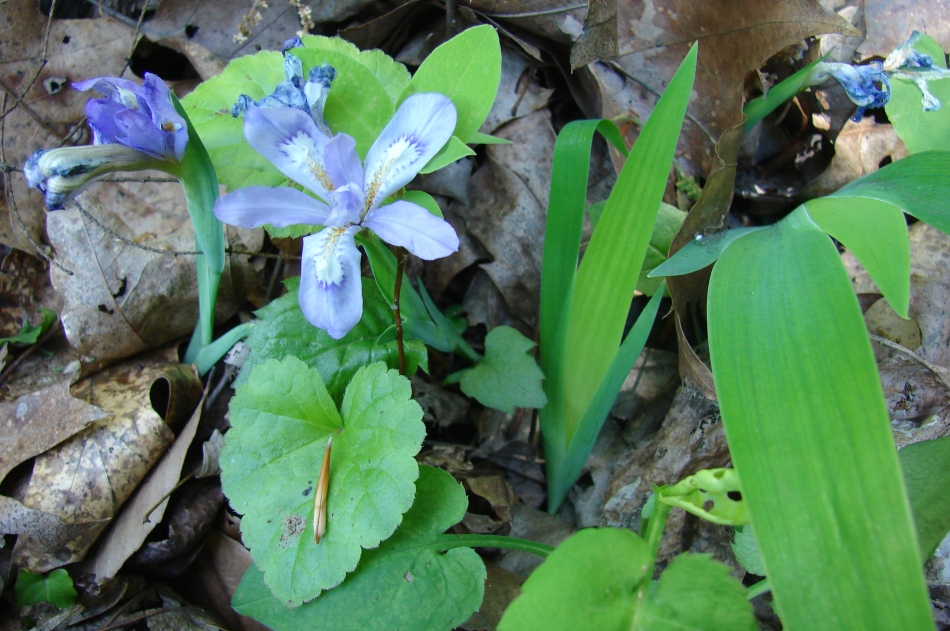
*
*
*
*
*
*
Primordial
Cool spring morning on the trail
the small dog runs ahead and stops:
barking, warning me, some danger.
She halts a box-turtle, dappled yellow
and black, crossing ‘our’ path.
Sort of cute, how she thinks she’s protecting me
as dogs are fond of doing with their fear.
So I let the ancient defender in her
come out, and stalk around the turtle again
again, as if we were closing in on a Mastodon.
My walking stick—a Neolithic spear.
I get down on my belly in the damp trail
among violets and dwarf iris, to see
our predator up close, to look it in the eye.
And oh, that eye, a cold red ring of fire
encircling a black expressionless coal.
Such cool blood can wait forever, staring
through me into space.
The scaly yellow arms curve down to fingers,
slow pink claws clinging bits of mud.
Ready to let the swift or strong win any race.
More ancient(and alive) than Mastodon!
And there, gripped in her hard yellow beak
of a snout—writhing pale and soft
the glistening body of a land slug,
Gastropod, a snail without a shell.
Two tiny stalks of antennae, inexpressibly
sensitive, reaching out, reading the air
trying to know: what quick, engulfing shadow
crossed the sky, ending its glistening trail?
* * *
Cacophony in Late Spring
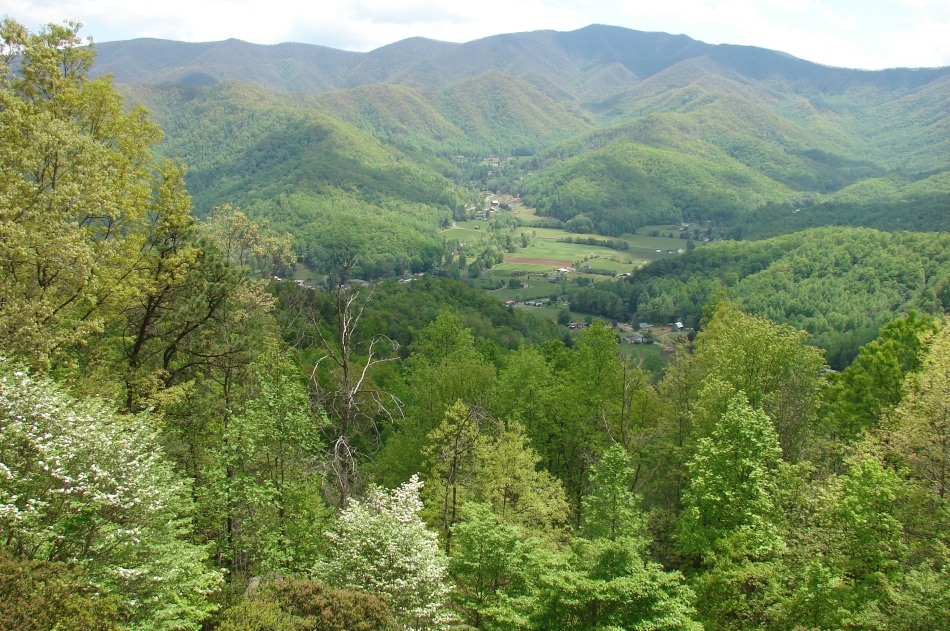
*
*
*
*
*
*
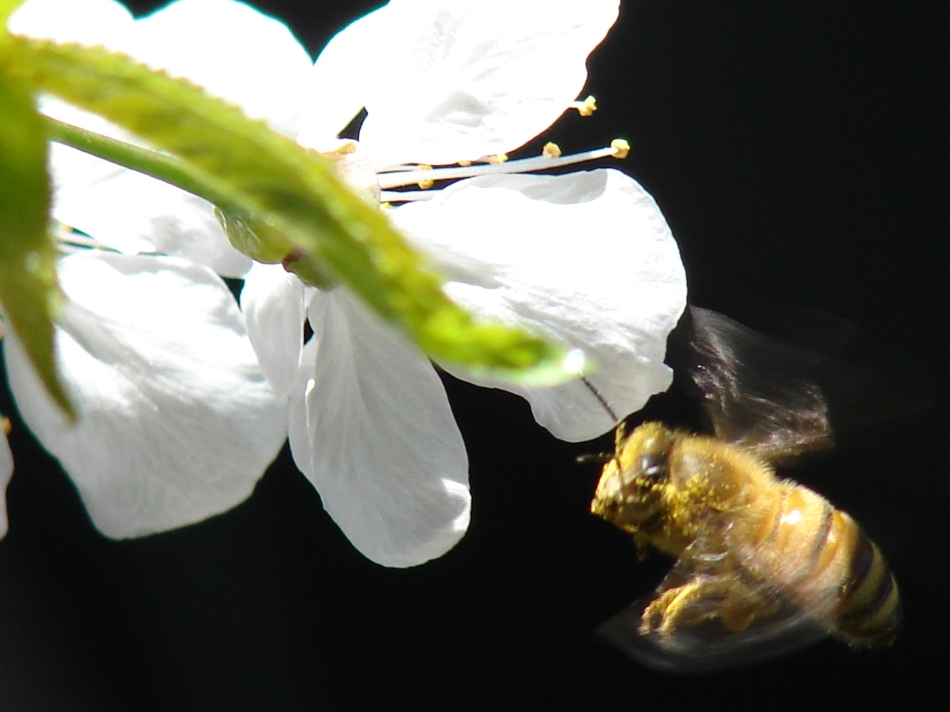
*
*
*
*
*
*
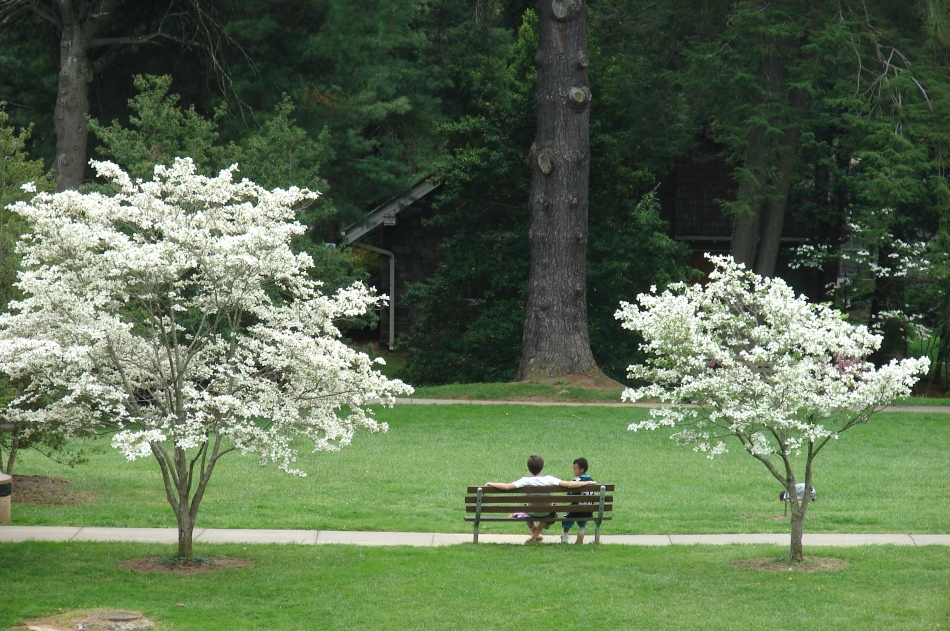
*
*
*
*
*
*
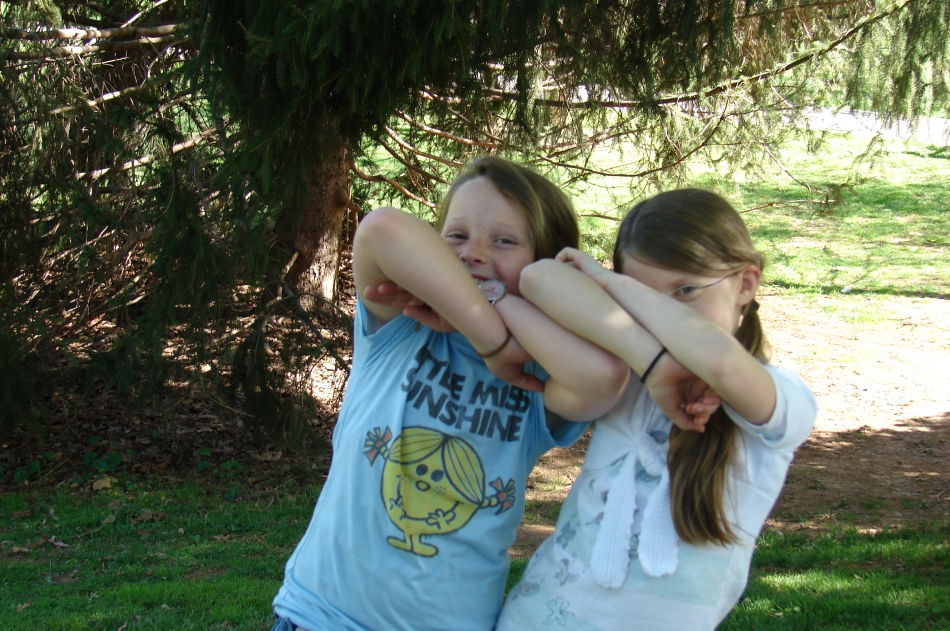
*
*
*
*
*
*
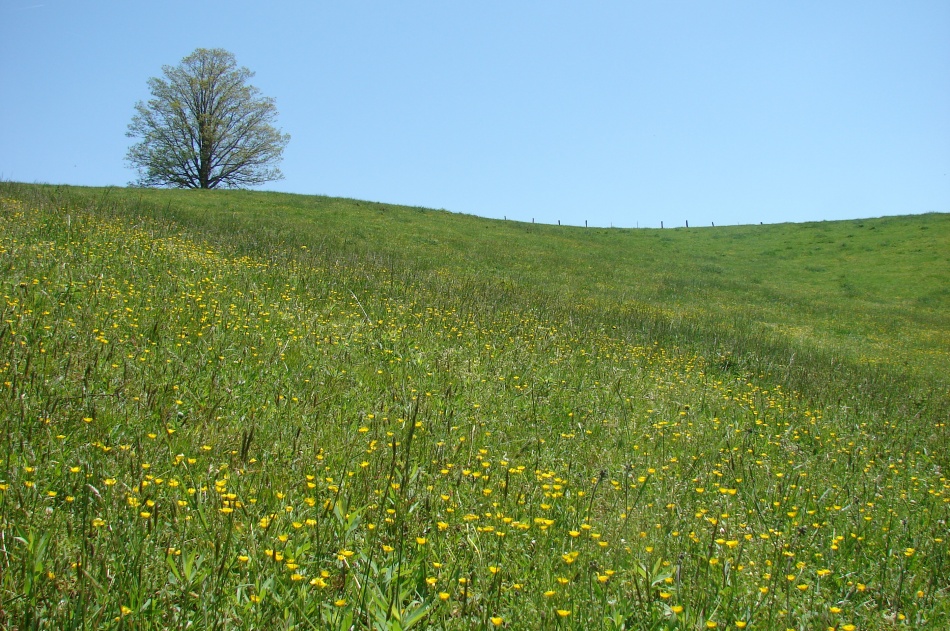
*
*
*
Cacophony in Late Spring
The wide spring fields are shimmering again
those wild fresh yellows : wind from the sun’s face
flashing the field-lark’s breast and song,
warm swaths of buttercup and mustard bloom.
Plum blossoms have already blown.
The last wet flowers of snow are gone.
Just yesterday a grey wind moaned the trees,
clattering naked limbs, blowing gusts of spray.
Today, the weathered wooden wind-chimes chatter
and play, chanting an ancient mantra with worn-out teeth
the way old Zen priests mutter. Neither do they know
or say the haunted ways of wind, of time and faces
how they turn, return, and turn again to go.
*
A flock of grackles gathers, screeching in the branches
of the gnarled black Ash.
The dissonant bird-music recalls: a creekside grain-mill
waterwheel squeaking and squealing its axle, spilling water,
coughing it into a mossy wooden trough that never fills
but flows back to the creek;
or a childhood Ferris wheel turning so very tall
in the happy music of its calliope, turned and gone
so far away, now sounding very like
“the little lone balloon-man, whistling far and wee”.
*
And yet the sounds come back to play with us,
even while turning on the axis of a vanished galaxy, spinning
spinning further away, rusting with the warm salt wind of years.
Tall grasses whisper secrets to the listening winter shore.
A zig-zag sand dune fence leans among the rustling oats,
the latch on its slatted gate is broken, it’s always swinging
open, closing shut.
*
Suddenly frightened, the grackles fly off as one
into the yellow wind. They will be back.
Always, everywhere it seems things are singing, turning
rusting waterwheels and Ferris wheels like clocks,
leaving fast on black wings the frightened flocks of birds,
our endless childhood suddenly gone
as cloud shadows racing across a windy field.
But all these things lost keep turning, circling back to us
on the long white wings of mind—deep-buried things
and faces—a searching sea-gone albatross.
*
All the harsh and soft remembered words
still screech and sing to us
like nesting birds— wandered far, yet always turning back,
yearning for their home.
* * *
Where do poems come from? (April 22, earth day)
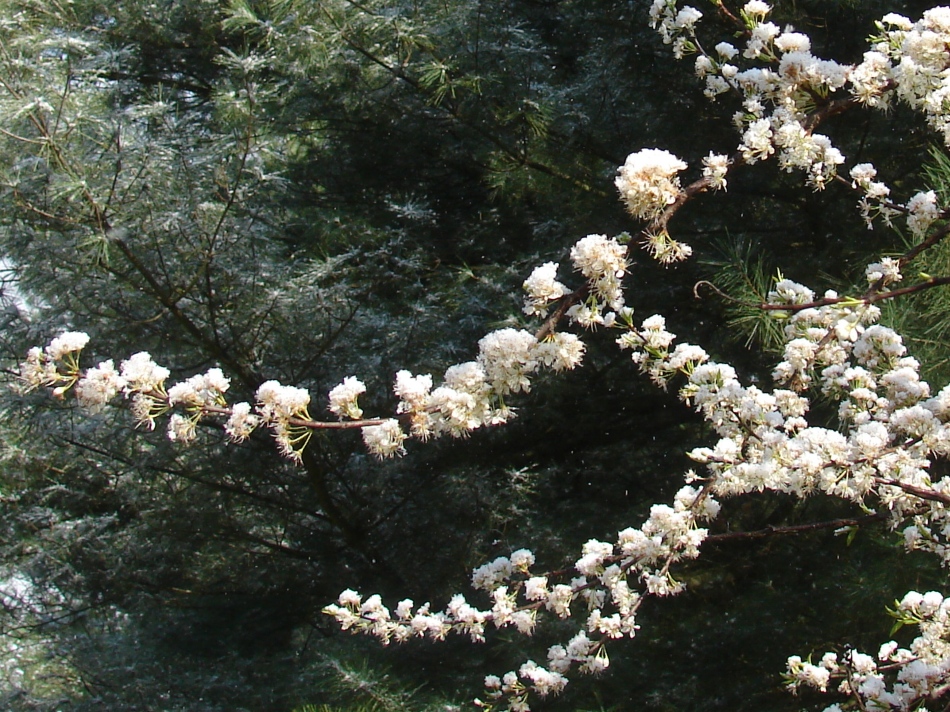
Wild plum blossoms, April Snow
*
*
*
*
*
*
*
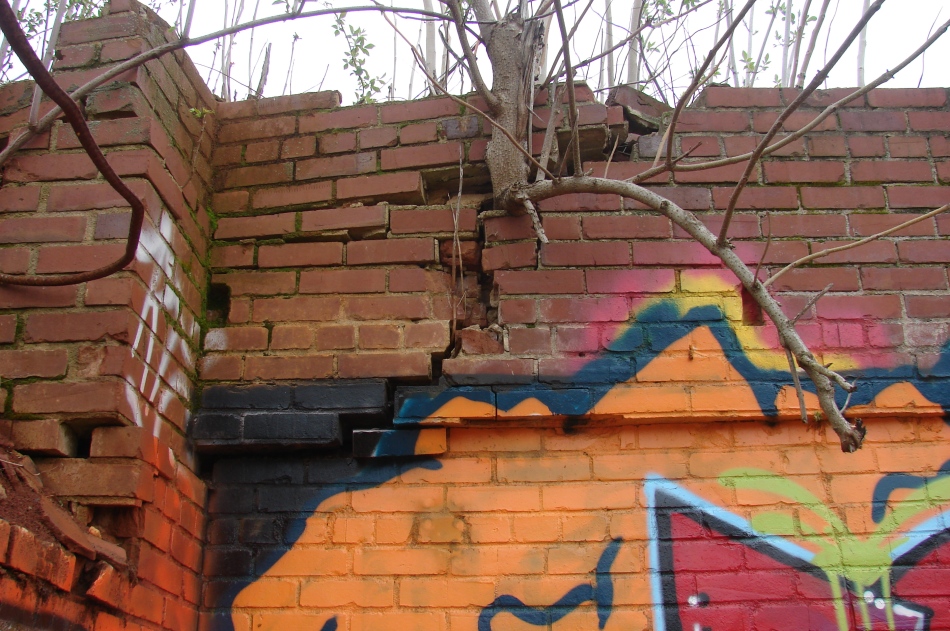
*
*
*
*
*
*
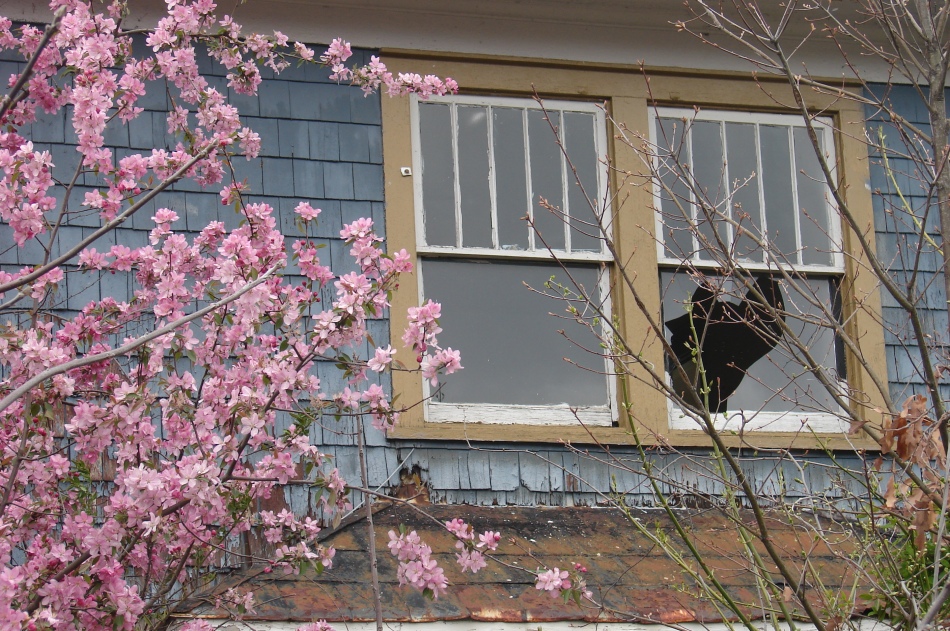
*
*
*
*
*
*
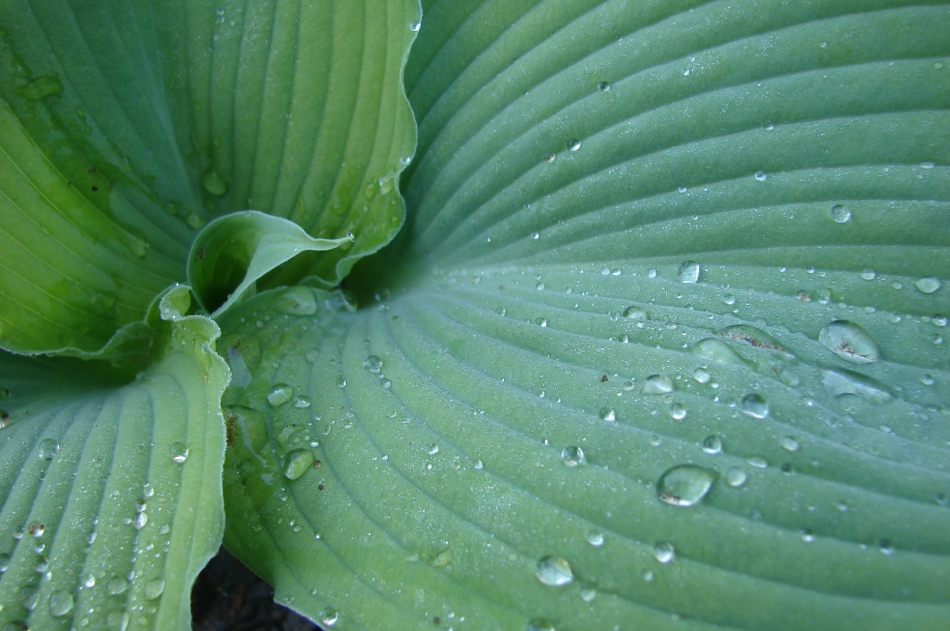 *
*
*
*
*
*
*
 *
*
*
*
*
*
*
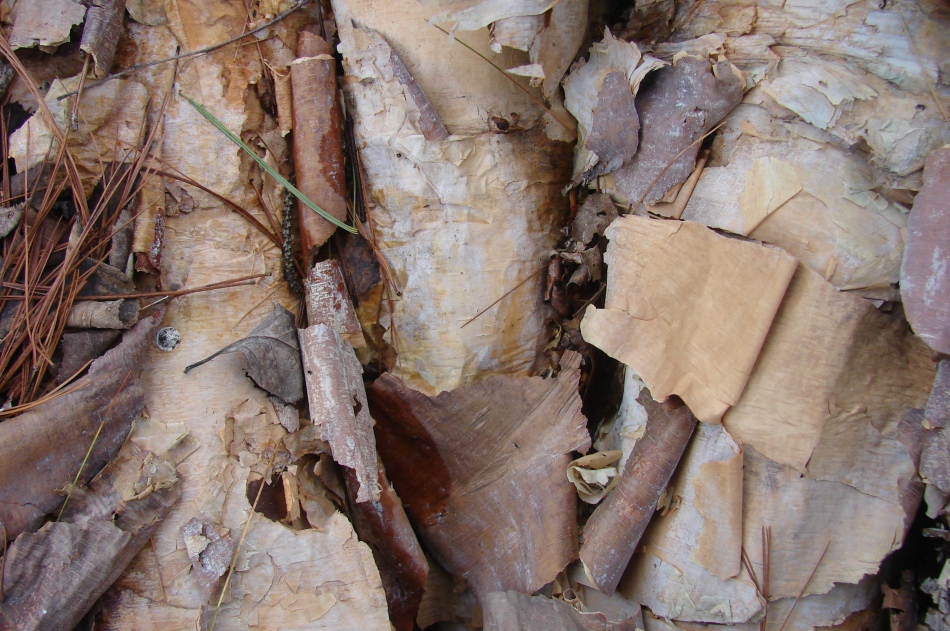 *
*
*
*
*
*
*
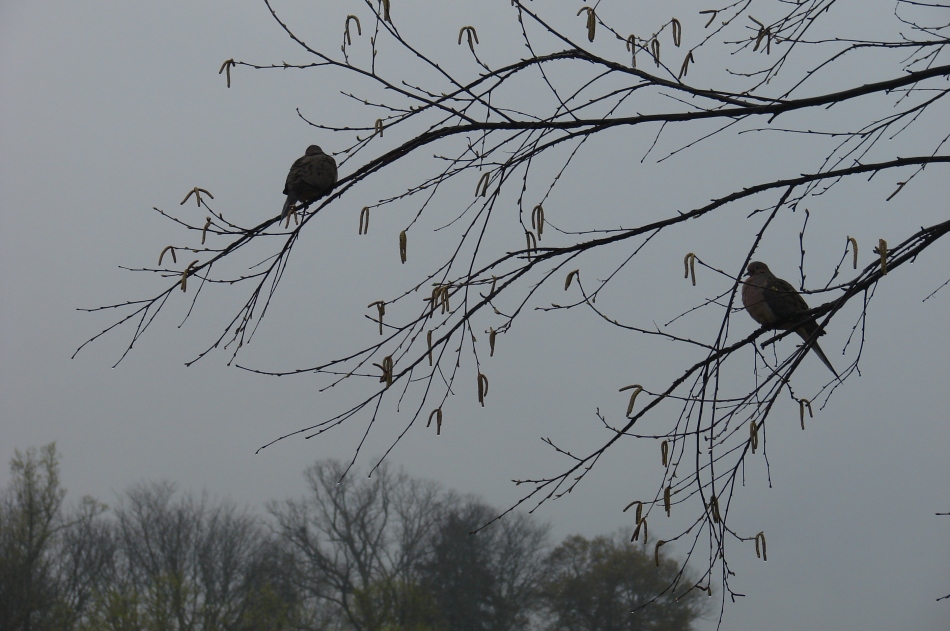 *
*
*
*
*
*
*
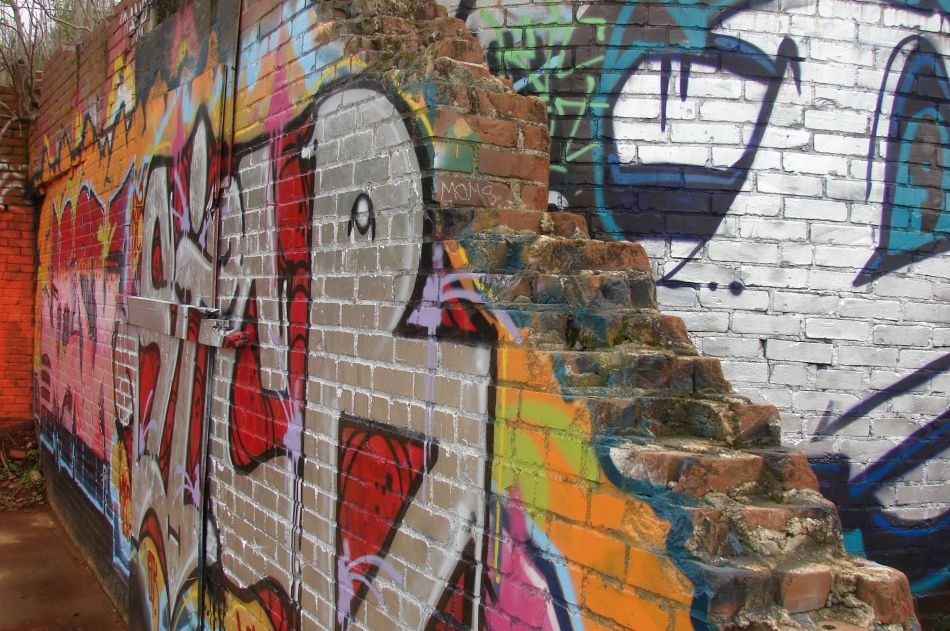
*
*
*
*
*
*
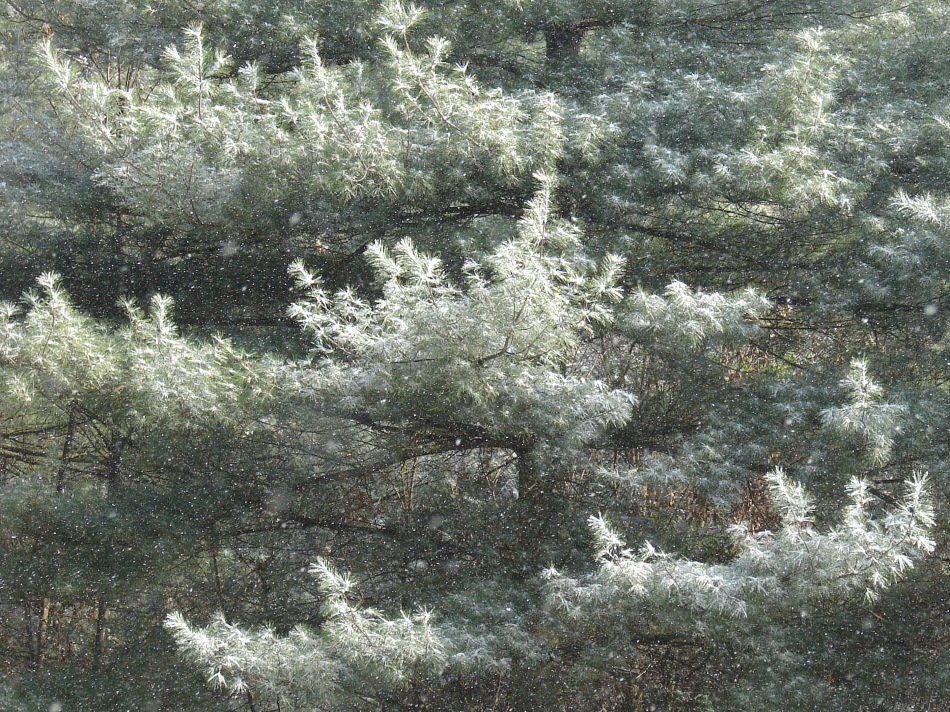
April snow, White Pines, sunshine
* * * * * *
Where do poems come from?
I thought I overheard him say
almost as if unto himself—
“I’ll put on my old blue barn-coat
and brown winter hat,
get a cup of strong black tea
and go sit on the back porch awhile
with pen and pad, perhaps a poem
will come to me”.
Is that how it happens? I intruded—
—a pungent wisp of woodsmoke
drifting past? Or the honeyed scent
of wild plum blooms
come gleaming like a ghost,
the way the thrush’s silver tune
brightens the gloom of cold grey woods?
—Is that how poems are born?
“Sort of, but not quite. More like
waiting for a furtive deer
to step on stealthy certain hooves
out of the underbrush,
where she appears in early light
her large eyes bright, and fully aware.
“Or maybe just sitting down
and breathing deep,
shedding anxious thoughts,
waiting the inner noise and strife
to hush, and fall away—it’s only then
we start to hear, to see: elusive forms
of truth, emerge.
We come aware that they were there
secretly watching us, all along, like those
already gone, or wanting to become,
patiently waiting us to make them friends,
to give them words.
And in our reaching, with syllable and song
we give them life.
* * *
A brief look at Black
^
^
^
^
^
^
^

^
^
^
^
^
^
^
^

^
^
^
^
^
^
^
^

^
^
^
^
^
^
^
^
^
Meditations on Black
Winter trees splinter the sharp morning light.
Stark silhouettes of living black
make abstract blue mosaics on the frost.
Crows and their shadows scatter like harsh words.
*
The child in us is thrilled, yet afraid:
the wide black lake transformed, overnight.
Those white blades of ice pierce us through
like the evil of absence, of separation.
*
Out of the low night land, mountain rims are risen
snowy and resplendent, exalted
like the old cathedrals wanted to be.
They forgot the glory came from Light.
*
Out of sordid darkness, our human streets
lift their summits: steeples rise to the crimson dawn.
Their pointed brilliance inspires, yet frightens us:
like an evil god too steep to reach, or love.
*
In the streets we keep our visage safe, and low.
Rummage the shadowy markets muttering
cliches, purchasing things. In vain we look to see
our true faces in the black windows.
*
As young men, Renoir and Monet
walked out together to the sunlit meadows.
Among the first to paint plein air
right there in the field, not drawing first;
*
Quick pastel impressions
leaped onto their thirsty boards,
parasols and water-lilies
danced happy on the watery light.
*
After a century of calendars
the shimmering still dazzles us.
If we could live each day in Giverny, perhaps
the shadows would not haunt us so.
*
But much later: to capture the pain
he’d felt and seen;
to uncover the hard bright masks
hiding our broken human beauty,
*
With talons of pain gripping his old fingers
Renoir returned to the dark.
Unlike the Impressionists
he chose to use black paint again.
^
^
^
^
^
^
^
^

^
^
^
^
^
^
^
^

^
^
^
^
^
^
^
^

^
^
^
^
^
^
^
^

^
^
^
^
^
^
^
I am the Lord, and there is no other. I create light, and I make the darkness.
-Isaiah 45, verse 7
*
The Word gave life to everything that was created, and His life brought light to everyone.
The Light shines in the darkness, and the darkness can never extinguish it.
–John chapter 1, verses 4 and 5
^
^
^
^
^
Be truly glad in your trials? -Yes!
*
*
*
*
“So be truly glad. There is wonderful joy ahead, even though you have to endure many trials for a little while. These trials will show that your faith is genuine. It is being tested—as fire tests and purifies gold—though your faith is far more precious than mere gold”. –1 Peter 1: 6-7 (NLT)
*
*
*
*
*
*
*
*

Dunamis!
*
*
*
“Dear brothers and sisters, when troubles come your way, consider it an opportunity for great joy. For you know that when your faith is tested, your endurance (patience) has a chance to grow. So let it grow, for when your endurance is fully developed, you will be perfect and complete, lacking nothing”. —James 1: 2-4
*
“It is good for me that I have been afflicted, that I might learn your ways, O Lord!” –Psalm 119: 71
*
“And yet these days of dreariness are sent us from above;
they do not come in anger, but in faithfulness and love.
They come to teach us lessons which bright days could not yield;
And to leave us blest and thankful when their purpose if fulfilled.” -anon.
*
“Pay no heed to distressing thoughts when they rise ever so strongly in you; no, though they have entered you, fear them not, but be still awhile, not believing in the power which you feel these (dark thoughts) have over you, and they will fall away from you, suddenly.
It is good for your spirit, and greatly to your advantage, to be much and variously exercised by the Lord. You do not know what He has already done (in your heart), or, what He is yet doing for you and through you”.
–Isaac Penington 1617-1679
*
“Why should I be upset at the plough of my Lord, that makes such deep furrows in my soul? I know that He is no idle husbandman, and that He purposes to harvest a crop”. –Samuel Rutherford 1600-1661
–all, from the Kadosh Ruach
*
Meditate on these foundational truths of the real life, and you will be blessed. Believe, and receive…….
* * *
Cane River images…..(my 100th post!)
*
*
*
*
*
*
*
*

*
*
*
*
*
*
*
*

*
*
*
*
*
*
*
*

*
*
*
*
*
*
*
*

*
*
*
*
*
*
*
*

*
*
*
*
*
*
*
*

*
*
*
*
*
*
*
*

Self-portrait
By the river, we are but shadows….and yet, we are eternal
It’s in the “little” things. . .
*
*
*
*
*
*
*
*

*
*
*
*
*
*
*
*

*
*
*
*
*
*
*
*

*
*
*
*
*
*
*
*
 *
*
*
*
Please read this, consider it carefully, and meditate on its simple but potent truth throughout your day:
” Little things come daily, hourly, within our reach, and they are not less calculated to set forward our growth in holiness, than are the greater occasions which occur but rarely.
Moreover, faithfulness in trifles, and an earnest seeking to please God in little matters, is a test of real devotion, and love. Let your aim be to please our dear Lord perfectly in small things, and to attain a spirit of childlike simplicity and dependence.
In proportion as self-love and self-confidence are weakened, and our will bowed to that of God himself, so will hindrances disappear, and the internal troubles and contests harassing our soul will vanish, and it will be filled with peace and tranquillity. ” -Jean Nicolas Grou 1731-1803
*
……Serve Him with wholehearted devotion, and with a willing mind, for the Lord searches every heart, and He understands every motive behind the thoughts. If you seek Him, you will find Him….”
– 1 Chronicles 28: vs. 9
*
May God richly bless your day, especially in the ‘small’ things. –Quilla
Do not be discouraged
*
*
*
*
*
*
*
*

Broken
* * *
“Do not be discouraged at your faults; bear with yourself in correcting them, as you would with your neighbor. Lay aside this anxiety, which exhausts your body, and leads you to commit errors.
Accustom yourself gradually to carry prayer into all your daily occupations. Speak, move, work, in peace, as if you were in earnest prayer, as indeed you can be. Do everything without agitation, by the spirit of grace. As soon as you perceive your natural impetuosity taking control, retire quietly within, where is the kingdom of God.
Listen to the leadings of grace, then say and do nothing but what the Holy Spirit shall put in your heart. You will find that you will become more tranquil, that your words will be fewer and yet more effectual, and that, with less effort, you will accomplish more good.” –Fenelon
*
*
*
*
*
*
*
*

*
*
*
*
*
*
*
*

* * *
“I will cry out to God most high; unto God, who fulfills his purpose for me” –Psalm 57: 2
“Whoever puts his trust in the Lord shall be safe” –Proverbs 29:25
* * *
Who’s in charge? (part 2):
“God has brought us into this time; it is He, and not ourselves, or some dark demon(or mere chance). If we are not fit to cope with that which He has prepared for us, we should have been utterly unfit for any condition that we imagine for ourselves. It is in this time we are to live and to wrestle, and no other.
Let us then humbly, tremblingly, manfully look at it, and we shall not wish that the sun could go back ten degrees, or that we could go back with it. If easier times are departed, it is that the difficult times may make us more in earnest—that they may teach us not to depend upon ourselves. If easy belief is not possible, it is that we may learn what belief truly is, and in whom it is to be placed.”
–John Frederick Maurice, 1805-1872
February 6/ Just who is in charge?
*
*
*
*
*
*
*
*
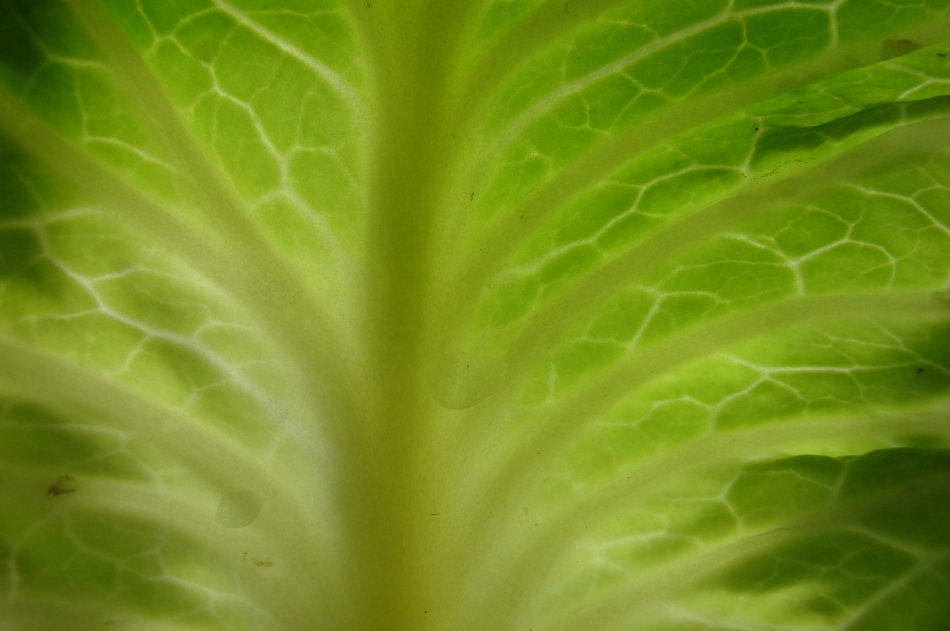
Life force
* * *
I am coming, quite slowly, to the fundamental understanding that the circumstances of my life are not random, nor happenstance, not even the smallest detail of any moment, of any day. Every single thread is part of a far greater weaving, which I am able to glimpse only in small portions, and for brief moments of insight. Most of the time I am abysmally nearsighted. But I am now absolutely convinced that Someone is behind all this. That Someone possesses unimaginable intelligence, creativity, passion, playfulness, humor and love. As is also true of us, “by His works, we know Him”.
But in the darkness cast by much scientific theory, especially over the last century or two, in those shadows it becomes somewhat easier to try to believe in randomness. At first glance, entropy even has a strange sort of attraction of its own, at least to the natural man. For if randomness is true, then there is no authority, no right or wrong, no ultimate accountability or responsibility for anything. Simply stated, nothing and no one has purpose, reason or meaning. No one is in charge. Therefore all moral codes and efforts toward the redeeming spiritual values of love, kindness, patience, forgiveness, humility, etc., are a worthless waste of energy and time, nothing less than a farce.
Under the dominion of randomness, this whole thing is nothing more than a fierce chaos, unfolding. The picture of a handful of marbles being thrown into a busy street comes to mind. (But if we think about it just a bit, we realize someone or thing had to throw the marbles, create their roundness, and the laws of physics, by which they bounce and roll, etc., etc.). Quite interesting, that randomness is either oddly quiet about such questions (as it should be), or it babbles the verbage of an idiot. –if you can stomach it, read some of the profane stupidity being written by several best-selling (so-called “bright”) a-theists nowdays. In all honesty, one must ask: would the world as they would have it be worth living in? Does anyone really want to be like these arrogant fallen ones? For indeed, we do become like those we emulate–whatever god we choose to worship. We are made that way.
But if one is intellectually honest and brave enough to face the logical consequences of a real universe functioning on the “rules” of happenstance, the attraction of it quickly fades. The ridiculous and absolute impossibility of such a reality quickly emerges, intuitively, even to such small minds as those of children, and to some of the very brightest among us. Sadly, many others do not see the truth of these things, because they do not want to see it. Facing it would mean that they are not in charge of life, or God, or the way things are.
To keep it simple, there is far too much order, cause and effect, and yes, beauty, joy, truth and consequences, for randomness to even begin to explain. So one inevitably comes to the conclusion that the true advocates of randomness are, as holy scripture defines them in many places: wilfully blind fools. “Always learning, but never coming to a knowledge of the truth”. “Thinking themselves wise, they become fools”. Unfortunately the case, regardless of what types and degrees of “intelligence” those advocates of randomness might possess. They’ve wasted their gift.
Furthermore, even the investigation of randomness, and the strong desire (on the part of some) to prove randomness to be “the order of things”–these very actions must obviously come into question as well: “We’re setting out, in orderly fashion, to prove that dis-order is the highest truth”. —yes, when you say it out loud, it does sound as preposterous as it is!
How ironic, that these ugly and unavoidable facts are themselves revealed as strong evidence for the very position they are attempting to disprove. Yes, “a mind is a terrible thing to waste!”
* * *
Controlling your thoughts……
“We take captive every thought, to make it obedient to Christ.” –2 Corinthians 10: 5
*
*
*
*
*
*
*
*

*
*
*
*
*
*
*
*
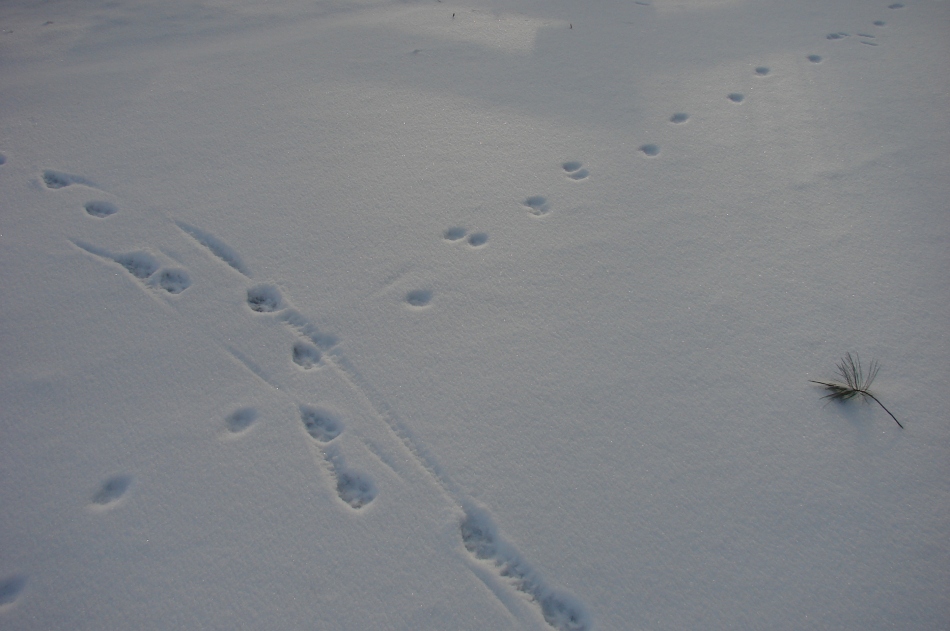
*
*
*
*
*
*
*
*

*
*
*
*
*
*
*
*
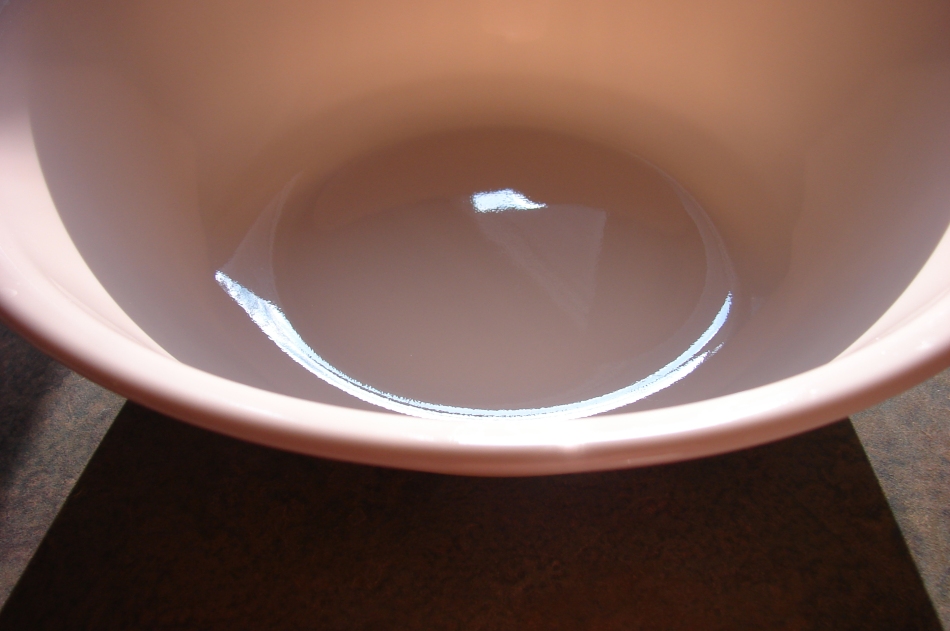 *
*
*
*
*
*
*
*
*
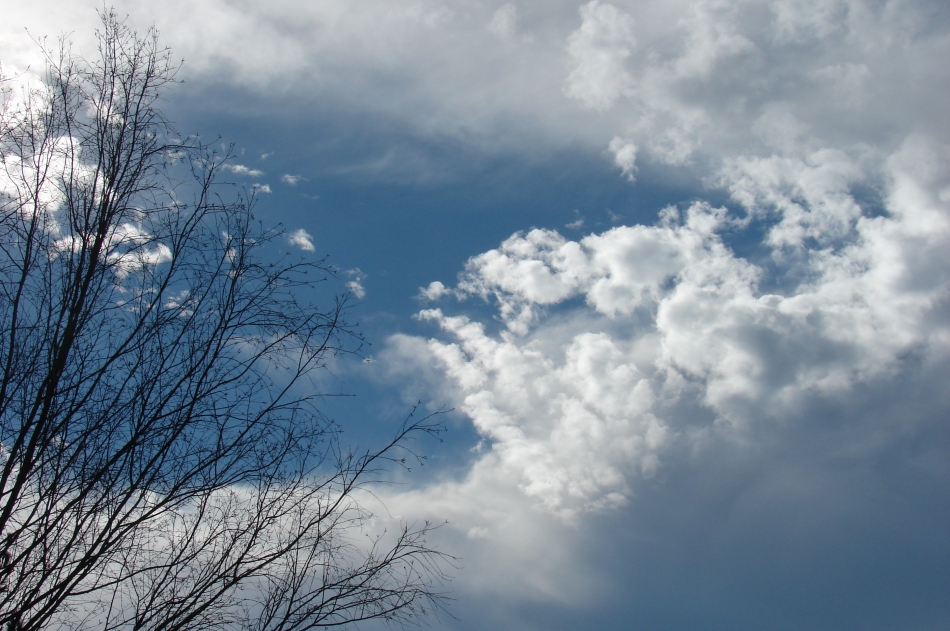 *
*
*
“There is another kind of silence to be cultivated, besides that of the tongue, as regards others.
I mean (the inner) silence as regards one’s self—restraining the imagination, not permitting it to dwell overmuch on what we have heard or said, not indulging in the phantasmagoria of picture thoughts, whether the past or the future.
Be sure that you have made no small progress in the Christ-life when you can control your imagination, so as to fix it on the duty and occupation actually existing, to the exclusion of the crowd of thoughts which are perpetually sweeping across the mind. No doubt, you cannot prevent those thoughts from arising. But you can choose to prevent yourself from dwelling on them; you can put them aside; you can check the self-complacency, or irritation, or earthly longings which feed them.
By the practice of such control of your thoughts you will attain that spirit of inward silence (and true peace) which draws the soul into a closer intercourse with God.” –Jean Nicolas Grou, 1731-1803
A daily prayer-verse:
“Let the words of my mouth, and the meditations of my heart, be acceptable in your sight, O Lord, my strength and my redeemer.” —Psalm 19: verse 14
The Gift

* * *
A Winter Love Poem
(From a young wife to her husband,
often away at night)
Softly, large flakes of midnight snow come whirling down around me, feathers
circling round the tall street light. They fall like dying moths, ghost wings
lost and spinning back to earth, pale remnants of our summer dreams.
But you’re not here to see them with me, love. Not here to chase and catch
the falling flakes with open mouths, hot tongues stretched out, laughing
clouds of steam like dizzy children, delighted to kiss these flying crystal things
thrown like magic dust upon us, flown straight from heaven, wild and white.
No. You’re out there somewhere in the winter night.
*
And the night—unspeakably immense dark eye, its black gaze glares above
beyond the snowy twinkling land. These pathetic rows of street lights
with their sparkling halos—Ha! they scarcely penetrate the swirling dark.
*
I fear your being out there in the storm, love driving home, the streets all glazed
a treacherous maze and frozen web, spun with danger, sudden loss.
Waiting for you, not knowing—enough, almost to make my softened heart
crumble inward like a warm snow-cave, burying everything huddled inside it
like a small candle. Oh how I wait and long, the warmth of you!
*
But here is One whose strong love shelters, holds me close, his mystery words
and ways tender and constant, than even you, dearest one.
And so it should be. We do believe He chose to weave my life-thread into yours,
and yours in mine. He tells me again, again, again across all time, I’m not alone.
Never to let my candle-lit heart cave in—the heavy snows of fear.
For He is near. He shows me often, at night, alone like this: His lamp
of hallowed love, of holy words illuminates the winter night.
In Him, I find a home that’s true. Indeed, this inner hearth, and fire—His love
for me—it keeps this tallow lit and burning faithful love, for you.
* * *
For Farrah and Stephen, January 09
Festival of Lights
“Look! A light shines in the darkness.
And the darkness has not overcome it!” —-John
*
*
*
That same light shines into the darkness of your soul, and mine, if
we but let it…..

“I create the light, and I make the darkness” –Isaiah 45:7
* * * *
“Do you know the way to the home of light?” –Job
* * *
* * * * Festival of Lights * * * *

* * *
My Mother’s Voice
(Revised; to be read aloud)
*
A hard winter night, listening
to her talking to me on the phone.
She’d just come home, three days
in hospital. Her life’s strong voice
was withering, scattering
like dry December leaves.
She even said she’d asked the Lifegiver
to take hers back, and let her leave.
Its greenness gone, she felt alone
spent and done with it, she said.
*
After we hung up, I put on
my dead father’s warmest coat,
and walked out into the howling dark.
Rags of thick cloud dragged
like a sad wraith, across the frozen moon.
Strong winds were bending
even the older, deeper-rooted trees.
Large black branches twisted, moaned.
*
Like thistledown, light snow
was spinning round the sickle moon.
Fine sharp snowflakes prickled my face.
Across the icy stones some withered leaves
went scraping. That sound was like
an old woman’s voice,
as if all her summer times
were past.
*
Down through the dancing black silhouettes
of windy trees lining the night street
I saw a bright and frosted window
filled with evergreen.
It was lit with twinkling lights
in the darkness and cold, sparkling there
like our eternal childhood, waiting
for everyone to see.
* * *
Please read Romans chapter 8, verses 18-25
*
Katahdin
Mt. Katahdin, Maine
* * *
Packing for a Trip
Bright warm Saturday, early autumn
wind scatters the dry leaves.
I spread old camping gear out
in the mown lawn–a trip next week
far to the North
to climb old Katahdin, again.
*
Opened to the sun, the little tent
unfolds a wrinkled staleness of old smoke.
Fire-stain on the mess gear.
Moss-scrubbed scratches, sand-washed
the falling creeks of years.
*
Where are they now? –once kindred ones
who shared the story of those fires
and snows, the heaving shadowed
candle love.
Would I know their faces, perhaps
their voices, long silent on the trails
of my mind. Would they know me?
*
I find a quicker desire, to tell
my daughters: where I’ve been and why
I’m going back twenty eight years later
(as if I know).
*
But the house is empty.
The older daughter is a barista
laying coffee down at a cool java shop,
her first job. And the other, younger one
has gone to the mall with friends.
*
I do not blame them for not being here.
Indeed, we must pack, and carry
many precious and heavy things
alone.
* * *
















































































































































































